#yes i will advertise via this . this event SLAPS
Photo

IN CHARACTER DATE : december 9th, 2020.
SYNOPSIS : the answer to the question of where is percy weasley.
TRIGGER WARNINGS : abduction & blood, torture implied.
and the panic sets in like this : slow and brutal, tar - thick in the back of his throat when he realises that he can’t move his hands. ( it comes as a double edged sword of terror and dread ; there is nothing he can do. PERCY is acutely aware of something sliciing neat ribbons into the flesh of his wrist, of the way blood trickles lazy rivers down his hands. ) hues haven’t quite been able to focus / devoid of either contacts or the glasses he only wears when he’s alone, percy’s never felt quite this helpless before. bound to god knows what and barely able to see : he cuts a desperate, sad image. he’s too afraid of the way the noise might ricochet in the silence, the way it might snowball into a sob that’ll wrack an attenuate ribcage. god, he feels exposed.
( and despite it all, he’ll cling to ludicity : he knows that screaming, begging, yelling won’t do him any good. crying out somewhere at the back of his mind, the sickened thought : this isn’t good. someone wants you dead, and if you scream you’re more likely to die. you cannot afford your mother another dead son, another casket her frail shoulder cannot possible bear. in the face of abject misery, you resolve to stay silent / complacent in your own disappearance. that’s if they notice, what if they don’t notice, what if a tree falls in the forest and no one is around to hear it scream --- )
somewhere, a rustle in the dark, and resolve crumbles. it can’t be helped. “please, help me, please.”
four words & suddenly it’s a performance / mask down, lights up, camera set, action. all the world a stage and the space is now a grandstand, one that amycus intends to milk for all it’s worth. he comes to life as if it’s that note of desperation that he’s been waiting for, puppet on string. he pushes wide the door of the room the other is held in as if it took force to burst inside, his chest heaving from imagined exertion, his wand clutched too tightly as if he’s ready at any moment to defend them from unseen terror. he looks equal parts terrified & frantic, as if he doesn’t know what’s around any shadowed corner and he wants to get them out of there as quick as possible.
of course, his steps falter immediately. a true rescuer wouldn’t hesitate to release the bonds holding the other in place, but AMYCUS holds back as if assessing a situation that needs no assessment. there’s a waver to his voice. “percy weasley. merlin’s beard... your family will be so relieved you’re alright.” he feigns a look over his shoulder, all the better for appearances. “i don’t know how much time i have...”
he’s begging. one sound from them and he’s already pleading, as if the sound in the dark is a savior, instead of specters plucked from ephilates of a tired generation. perhaps it would be a mercy to cut to the chase, but the carrow twins, well, they’re known for playing games. that’s all this is, isn’t it? their way of playing god by toying with percy like he’s little more than a plaything in the hands of spoiled children.
ALECTO lingers behind as amycus enters the room where the weasley is kept, falling into her own role. “did you find him? do you need me to come help?” her distant voice slips into the overlap of breathless apprehension and uncertain hope, the cadence of a rescuer watching for the return of the monster under the bed. languid are her movements as she paces, wand tapping across knuckles. “you have to be quick!”
if foreboding was a tight knot in the colum of a constricted throat earlier, it’s the cold tendrils wrapped tight around flesh now. solace would’ve been a warm blossom through limbs if PERCY wasn’t so brutally aware of who his supposed rescuers are : he’s no fool. the carrows’ faces have snarled up at him from posters since his days at the ministry, and a new wave of trepidity rolls right through a quaking, bound frame. ( as hard as he tries, there’s a buoyant little squeak from the backburner / “what if they’re here to help?” he’s many things but an idiot isn’t one, he knows that no good can come of the pantomime he’s found himself embroiled in. there’s nothing resembling hope in the scene that has begun to unfold. it’s strange, really : the brunt of percy’s heartache is borne of worry for the family he’s convinced he’ll leave behind. own mortal peril is LESS of a concern than their collective grief / he wishes, in these strange moments that he’s sure will be his last, that he could apologise to molly and arthur. sorry mum, sorry dad. you deserved better than this. )
“where am i?” he’ll try to amplify the modicum of bravery that’s set into his tongue, but it wavers / intonation gives way to distress and percy sounds like a fucking child, so far removed from his near-thirty years. “how long have i been gone?”
he’s more intelligent than they’ve given him credit for. there’s a spark of recognition in those wide, fearful eyes that couldn’t be DISGUISED if he had the forethought to try, and AMYCUS is almost colored impressed by it. the emotions rolling through him - terror, dread, uncertainty, grief - were so powerful in origin amycus had trusted in a cloud of doubt thrown over their faces, but percy weasley is not as much fool as the family name implied.
he casts a glance towards his sister, the sort they don’t need to couple with words ( it’s an old wives tale that all twins can communicate by thought, but the carrow twins are an old time terror, aren’t they ? two little children born to blood, lying awake in the dead of night and learning each other’s faces better than they knew their own ). it says he knows, even while the tiny smirk that pulls at the corner of his lips says, but we can work with that.
“you’re just outside of swindon,” he’s turned back to the other now and his expression is back to faux care, back to something that resembles genuine concern - all it misses, now, is the added note to a purposely trembled voice. amycus abandons this, now, going for confusion above flawless PERFORMANCE. “that isn’t a detail you need concern yourself with, percy,” long enough for the questions to start, yet not long enough for the printing presses to begin churning out the missing poster. amycus does not make a show of dropping the facade, once and for all : it is simply there, and then not. “the question is how much longer you have to stay.”
the hope in his voice gives way to an ill impersonation of courage, and ALECTO finds that it sounds little more than that of a child’s mettle. her brother looks to her and she reacts with a quirk of her brow, a casual cant of her head. ( he does? how boring. ) when she steps from the penumbra cast by the empty, unlit room she was waiting in prior, she looks a touch uncanny, with cheeks just a bit too hollow and pallid skin just south of a typical color since leaving azkaban. almost normal, if not for the little things. “quite ugly place, really. don’t know why anyone would wish to come here.” words border a taunt, an almost cloying thing on her tongue. only a matter of time before they figure him gone, and she’s called to work. certainly just enough of it to begin pulling at threads, to the start of unraveling it all. she takes a step or two forward, and it’s like she clisk into something, a return to herself maybe, when she falls into place next to amycus. she plays off of him. “and how long it’s going to take your family to notice. any guesses? no?”
it comes and goes in waves : the startling clarity that chills him right to the bone ( i am going to die at their hands i am going to die here i am going to be another tragedy upon the family name oh god mum i’m so sorry i’m so sorry- ), and then the hysteria that crowds his throat, makes him want to laugh in sheer delirium. it is altogether surreal, to feel your pulse running cold one minute and chruning something intemperate in your ears the next / PERCY weasley, alone with the carrows. fate has a funny way of rolling the dice, only to leave you stinging when you lose.
“what do you want?” ( an altogether practical question / percy’s never been one to sit around, wait it out. their histrionics do nothing for a choleric captive ; not when blood is still running thick rivulets down palms of his hands, when he’s bitton so hard at a lower lip that it too glistens crimson. there is a trace of it on his canines. he doesn’t know. ) “i don’t have anything you’re looking for, i swear.”
AMYCUS is a predator circling prey as he moves further into the room and closer, still, to percy. alecto joins him and only near to his sister does he feel - in an odd way, confident enough - to crouch at the others level. "don't insult yourself or our intelligence," it's funny, the contrast : his expression is cold but his voice is almost velveteen, low & warm & in any other setting, any other situation, nice.
"you aren't the only person with the information that we need, percy. you're here because ronald and ginevra aren't, but don't doubt in our willingness to abandon you here, alone, and finally introduce ourselves properly to your brother... or reunite, with your sister." he smiled. again : pleasantly. if not for the context of carrow, amycus would be nothing more than a professor expressing interest in catching up with an old student. "i promise that you don't want that to happen, and to stop it, all you have to do is tell us what we want to know."
pulse throbs something fierce behind eyelids, violent underneath the sacrum of his throat, helpless in the way he cannot move. “don’t you dare touch them. don’t you dare.” ( his heart beats a little faster at the mere mention of younger siblings. all those years spent chastising, picking at them, far too overprotective and never as kind as he should��ve been : symptomatic of a love that doesn’t know vernacular confines, that only knows the kind of rage that builds an inferno behind gritted teeth when they’re referenced like that. ) clever wizard that he is, PERCY can only kick out ; nearly loses his balance, almost topples his little prison over. it’s an adrenaline rush he needs / the kickstart he needs to spit another falsehood like a loose, bloodied tooth.
“i told you, i don’t know what you want.” and to some extent, he doesn’t : captor keeps mentioning information that he doesn’t understand. “nobody told me anything.” feigned reticence suits him ; percy makes a wonderful liar, all bruises and swollen despite the way lies make his stomach twist into sailor’s knots.
there’s a roll of dark irses, a testament to patience lost during her time in azkaban. “you’re right, how can you be so sure you don’t know without us even asking?” cadence borders something sing-songy, something sweet enough to rot. long strides bring her around his chair, where hands push down on the back, balancing what he had almost thrown askew. the legs are strident when they return to hardwood floor. percy’s boxed in by them both, now, and though wands aren’t drawn, they don’t need to be to prove a point. “it’s easy, percy. where is harry potter? his body, his things...” ALECTO paints an almost innocent picture with wide eyes and relaxed posture as she lingers over his shoulder. “and a little tip --- we don’t take too well to being lied to. my ideal day may not be spending time with the most boring, self righteous weasley, but like amycus said, we can just as easily go to one of the other, hm, is it six of you now?”
and the thing is, every fivre of an aching being is straining against this ! the hard line of a jaw is stiff with muscle, and yet it happens anyway : in light of alecto carrow lingering over his shoulder, circling like a vulture, PERCY laughs. it’s entirely humourless, dry and barked into atmosphere so tense you could carve it, but it happens. ( for what it’s worth he regrets it immediately / urge to be violently sick follows it, but he’s able to swallow that one down. )
“you think they told me where his body was? jesus fucking christ,” ( muggle london has fouled up that mouth --- ) “you can’t possible think they told me that.” hysteria is a slow bloom that’s spreading through blood and bone alike, deadly in the way it seems determined to swallow him whole. “every bit as fucking daft as she is, you two, thinking they told me anything. fuck.”
percy knows the price, knows it intimately before he’s even spoken. you don’t leave something like this unscathed, something like this without the battle scars to prove it. he knows, deep in marrow, that he isn’t leaving this alive. shaking, terrified, quaking with nothing but sheer fury, he steels himself for the bloe before it even arrives. this is what happens when you lie, when you laugh. this is what happens, and so it goes.
the carrow twins move deliberately. they move as one. where one pushes the other pulls ( like opposing magnets, still connected in some indescribable way ), always compensating for the other on little more than blood instinct. alecto crosses to steady percy and amycus - in what is almost bored glory - rises, only then, to his full height. she leans left, he takes a step right. she focuses upon their charge, AMYCUS allows his attention to float. he undoes the buttons of his sleeves, both rolled up slowly to expose arms that are mottled by stark white scars & marred by one recognisable tattoo.
"percy, percy, percy," he clucked his tongue, caught between chilling disapproval & aching disappointment. there's a reason that he keeps using his name, as if they're old friends caught in something neither can control : a power to claiming it, an added threat. "we already know of the boys connection to your blood traitorous family. all those summers spent under the same roof, one more child for your overworked mother to wrangle... of course you know where he is. your family loved him."
"i'm sorry, percy. i know you'll tell us what we want to hear-" he sighs. gaze flickers towards his sister, an almost imperceptible jut of his chin given to urge her to stand away from the seated boy, and from his back pocket is pulled a wand that is, even without brandishing, a threat. "but we did tell you not to lie." the striking of a snake : predator meet prey.
with the reverent uttering of "crucio," amycus' wand slashes downwards.
#nox.important#nox.event009#i do love .......... fun <3#hp rp#harry potter rp#appless rp#fandom rp#canon rp#oc rp#yes i will advertise via this . this event SLAPS
8 notes
·
View notes
Text
How Much Would You Pay For Privacy?
Words by Alasdair Cannon

This is the bizarre question I have found myself pondering as of late. The question is bizarre because, well, one would assume that we have some inalienable right to privacy in a democratic nation. Right? Simply asking this question surely indicates a fundamental failure of governance, of regulation, or the market. Conversely, one might conclude that the notion of privacy has been plunged into a kind of Coasean nightmare, where our ability to be free from invasion is subject to bargaining, to the market logic of efficient distribution, to the skyscraping (campusing? If we’re gonna speak in the language of the companies in question) power differential between the individual and corporations in modern economies. One may be correct in either instance, too, which leads us to something of a truism: it is never easy when we must negotiate something we have perennially taken for granted, or when we must value what we believed to be invaluable (and not because it could not be measured, either).
In any event, the question is certainly a new one - or at least it probably isn’t something that people 30 years ago were overly concerned with. Why would they be? You (or the government) would have to be active, to the point where it was comparatively a non-issue, in telling (or collecting) your entire demographic and psychometric profile, and the history of your activities and movements, and all your wants, desires, preferences and interests. One couldn’t tacitly or incidentally just reveal all of this. Hell, even if you were utterly dedicated to revealing all these measures of your individuality to the world, even if you were possessed by a data-point exhibitionism of the most pathological kind, and you perversely wanted everybody to know you fundamentally, information-wise, you would still have a hard time of it. Data simply could not be collected comprehensively or efficiently enough to ground even individual concern over being so thoroughly revealed.
Today, however, we can and do give our whole selves away with a single click. And we do it in a manner that suggests an equilibrium solution: we value our privacy exactly in proportion to whatever it is the company stands to offer us.
Here’s an article from the Guardian that can help you freak out over that point.
No doubt, it is a question that I ask in light of recent events: yes, I specifically mean Cambridge Analytica, whose databases include ‘four to five thousand’ data points on every adult in the United States; whose platform relies on mass psychographic analysis of vast swathes of people as a means of generating a predictive model of personality for individuals and groups; whose product was employed in the most recent US election of Donald Trump, and in the primary campaign for Ted Cruz. (Watch this video to get a little taste: the man seems really quite proud of his product, and he really does give you a good salesman’s spiel about all the amazing things they know.) The public consciousness is properly fretting, perhaps for the first time ever, over the true influence of social media. We have been building to this for years of course – talk of shady contractual provisions and fake news being the breaking point for the outpouring of our collective anxieties.
I share a lot of sympathy for these emotions. The rise of social media and ICT as an overwhelming force for individual identity is something I have wondered about in increasingly panicked tones over the years, my internal intonation creeping ever closer to ‘paranoid-hysteric’, to that of a bug-eyed, frothing conspiratorialist, all fervour, dual-wielding copies of Huxley and Orwell, with Foucault buried somewhere in their coat pockets. No, I don’t own Discipline and Punish, but I certainly wasn’t far from this point. Indeed, there has been something of a positive correlate between the frequency of my tech-anxiety and ‘distance stumbled down garden path’: though mitigated to some extent by the countervailing forces of ‘kinda getting used to it’, ‘are you surprised by this?’, ‘who cares?’, and ‘there’s nothing you can do about it’, it has increased, absolutely. Crucially, I do not believe I am unjustified in feeling this way: recall, well, what I said a couple of paragraphs ago.
From when I first listened to OK Computer through to April 2018, the fear has escalated. Some discontinuous leaps were made: discovering the Google Beacon, for example, a nifty device that will be just, oh, everywhere in certain developed economies, which interacts with your smartphone as you move through public spaces, transmitting and presenting data constantly, an activity directed at unifying your subjective motives into one glorious vector of consumption. On a corollary note, here’s another good one: that day I bumped into someone I hadn’t seen for five years, and an hour later, Instagram lets me know I can follow them: now that’s convenience. Mutual benefit off the charts. There was also the day I realised (that is, I read what former Facebook developers had to say about their own platform) that, given we do not pay for Facebook or Google, that we were in fact, their products. That was a knock-your-hair back kind of moment for sure.
Before the Cambridge Analytica scandal, the object of my concern was the advertising revenues of Facebook and Google. Check out these graphs of their lifetime advertising revenue, for example. Between them, they grossed $135bn in ad revenue in 2017 alone. Facebook boasts 2.2 billion users, and though I lack an exact statistic, I believe we can safely assume Google likely has a similar number of unique users. If we assume the groups overlap entirely, then this puts the ad revenue per user at roughly $68 per user. To be safe, if we instead calculate the ad revenue per person alive today, it comes out at $18.50. So, the real number is probably somewhere in between – and given the past performance of these companies, don’t be surprised if it keeps growing. Their net profit per user is more modest than this: search engines and social media platforms aren’t cheap to run, after all. They also do provide an undeniably valuable service, and so these figures are justified, economically speaking. Crucially, though, the entire foundation of their revenue base rests upon the willingness of the consumer to simply give away something that is, evidently, extraordinarily valuable to these companies: their life in data. Irrespective of the value they add via their database and network effects, or the advertising services they sell, or the entertainment and utility they provide for free, these companies are wholly reliant on our initial, unwitting consent to donate to them our time and information.
And for what reward? What mutual do we derive for sacrificing our privacy at the altar of the internet, for slapping our knowable selves down on the counter? Their products of course; platforms that are today extraordinarily popular, and not only because they are useful and powerful. In the words of Sean Parker, early investor in Facebook, their design motive was couched in exploiting addiction and vulnerability: ‘How do we consume as much of your time and conscious attention as possible,’ he says. (Google is not complicit in this regard – it seems pretty hard to give a dopamine hit from a search bar, after all. Their product actually is that useful. It does, however, have a couple of implications for freedom of information and control of opinion – a topic for another time, maybe). Their bottom line relies on the maximum exploitation of the consumer at the lowest cost possible – an historic market relation that encourages continuous and absolute loyalty of the consumer to your product. And what better than the inelastic demand created by suckering the user into a state of addiction? As Thomas Pynchon writes in Gravity’s Rainbow: ‘The classic hustle is still famous for the cold purity of its execution’. Addiction, indeed, creates an ‘inelastic demand for that shit.’ It is a profoundly simple arrangement, based upon simple economics and human fallibility, reductive enough to a symbolically dichotomous relationship – despite its cynicism and denial of human good. Any degree of observation can confirm that both the consumer and the corporate giants have become entwined in an archetypal relationship, with each side of the historic dichotomy played unflinchingly: the naïve fool who, unware of the value of what they possess, is unknowingly exploited by the powerful. And in a fashion that righteously emboldens the cry of ‘abuse’, they have treated us with the disrespect a tyrant affords to the vulnerable.
Facebook’s Ad Revenue Worldwide from 2009 – 2017, in millions of dollars
Ahem. Well, if it wasn’t already self-evident, essentially, what I am saying is that these companies are no longer fucking around, socioeconomically speaking. When combined with the fact that our vulnerability and our proclivity for addiction is their product, this becomes problematic, to say the least. This therefore brings me to my point: I ask my initial question on whether we should pay for privacy in the broadest possible terms, for my concern fundamentally lies in relation to the growing dominance of the sociocultural forces constituted by social media, by search engines, by algorithmic targeting, by gargantuan psychometric databases, and by utterly pervasive online and mobile advertising. We are the known, the manipulated: the consumed and the consumer. Queue images of the snake eating itself, or perhaps more fitting for a late capitalist society, that weird rumour about Marilyn Manson and his rib surgery.
Clearly, Google and Facebook value the contents of our privacy quite dearly, and it is this fact which tacitly establishes the value of privacy in our economy. Giving it away for free, or for any amount equal to the perceived value of the product on offer is clearly foolish: to do so, unmediated by regulation or subjective concern and awareness can only serve to reinforce the pre-existing paradigm of our exploitation and disempowerment. Choosing to maintain this relationship would only attests to our indifference; to the absolute normalisation of the invasion and harvesting of our privacy; the colonisation of our mental space via the wonderful corporate algorithm; phenomena which all testify in unison to the powerlessness felt by the average consumer in a social media market controlled by some of the most advanced and powerful entities in human history. Maintaining this relationship is to welcome its logical conclusion, the inevitable and absolute extreme of personalised advertising: a utopia of prior-decidedness, of subjugated contingency. Is that a life lived in bad faith or good faith? It’s an authentic you, imposed upon you externally: a Sartrean knot if there ever was one.
Of course, the big one has only just arrived, the paradigm shifter par excellence as I would hope – the Watergate for the Zuck, if you will. Time will tell whether this brings about meaningful reform in the digital sphere. Given how long they have staggered untrammelled over the landscape of technological societies, how focused and efficient they have become in their practices of exploitation, I am not necessarily optimistic. Unless, of course, we learn from these companies, and come to realise the unmistakeable value of knowing ourselves: a condition that is inseparable from power over our own lives.
SEE MORE
http://adage.com/article/digital/sean-parker-worries-facebook-rotting-children-s-brains/311238/
https://www.theguardian.com/technology/2017/nov/09/facebook-sean-parker-vulnerability-brain-psychology/
https://www.statista.com/statistics/266249/advertising-revenue-of-google/
https://www.statista.com/statistics/271258/facebooks-advertising-revenue-worldwide/
0 notes
Text
WCW Monday Nitro 10/06/1996
“It’s time to get rockin’!” proclaims Tony Schiavone as the fireworks go off, and we’re welcomed to WCW Monday Nitro live on TNT.
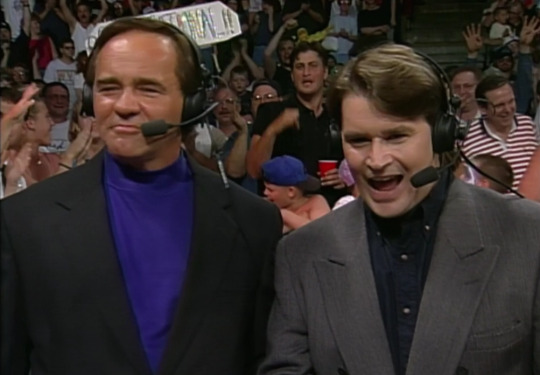
Larry appears in surprisingly normal attire this week. And he looks rather pleased with himself, too.
We’re a week away from the Great American Bash, and we’re told that the main event of this episode of Nitro will be Arn Anderson & Ric Flair against Joe Gomez & the Renegade. Gee, I wonder who’s going to win that one? You may remember the Renegade as WCW’s attempt at an Ultimate Warrior rip off.
We’re also getting the Giant Vs Scott Norton in hour number two. That should be hard hitting.
Tony mentions Scott Hall’s interruption of Bischoff from the previous week, and recaps Sting’s rebuttal. No explanation as to why Hall isn’t barred from the building, as there is no indication he works for WCW... but hey. This plot hole does get filled eventually. Kind of.
Our first match gets underway, and out first is Booker T...
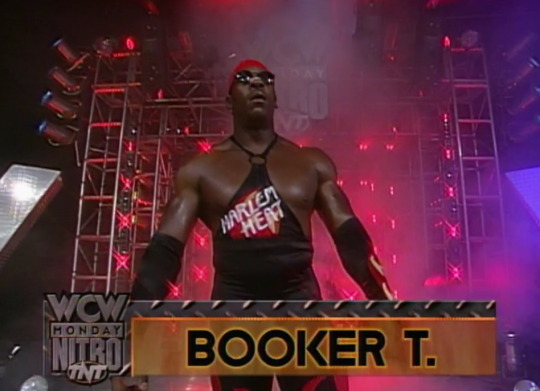
He walks out looking vaguely confused. As the camera pans to the fans, Schaivone says “look at the fans, they are living”.

Yes, they do appear to be alive.
“Here’s a story of two brothers, Ricky and Scott...”
Booker’s opponent is Scott Steiner and his ridiculous arms.

Booker T Vs Scott Steiner
Tony advises that viewers call their family and friends to remind them that the Great American Bash is six days away, and now would be a good time to tune into Nitro. You have to assume if these family and friends were really into WCW they’d be aware of the upcoming PPV and the fact that Nitro is on... but anyway.
Both wrestlers play to the crowd. Generally boos for Booker, and cheers for Steiner. From recollection Harlem Heat were essentially being booked as heels at this point. The WCW crowd isn’t just being racist. Well, not all of them at least.
The two wrestlers lock arms back-to-back.

Booker realises he’s made a mistake here.
Steiner attempts a variety of suplexes, which Booker slips out of and reverses. Booker then misses a kick and ends up taking an underarm suplex. Booker then eats an atomic drop and is clotheslined out to the floor. Steiner dishes out a quick beating on the outside and then throws Booker back into the ring. The commentators, invested in the match as always, are talking about the Horsemen Vs Greene & McMichaels at the PPV. Larry says the Macho Man thinks he’s Napoleon Bonaparte. I can’t imagine Macho Man even knows who that is.
Booker finally lands some offence by catching Scotty with a kick in the corner, then hits him with a scissor kick and gets a two count.

They do this for a while. It doesn’t look particularly painful. Steiner fights out of it, but then gets hit with a scoop slam. Booker climbs to the top rope, hits a cross body block and gets another two count. Steiner hits a reverse DDT on Booker and hits him with a back body drop. Larry tells us that aggression is good in wrestling (you don’t say?) and claims that whoever hits offence first usually wins the match. I’d like to test that theory.
Booker gets hit with a belly-to-belly, but Scott then misses a Frankensteiner and gets smacked with a flying sidekick.

Bam. Tony calls it a “spinwheel kick”, which is ridiculous as Booker did not spin.
Booker hits a side slam and goes up for what you would assume to be the harlem hangover, but no. He just kind of flops into the middle of the ring as Scott Steiner rolls out of the way. Larry calls it a “swan dive”. Another belly-to-belly from Steiner, and he gets the three count. That was a very quick ending to an otherwise decent match.
Scott Steiner beats Booker T via Pinball.

For some reason these two idiots are practicing for football again. Shouldn’t the Macho Man be there to remind them that they’re wrestling now?
We’re back with Mean Gene, who is interviewing Scott Steiner.
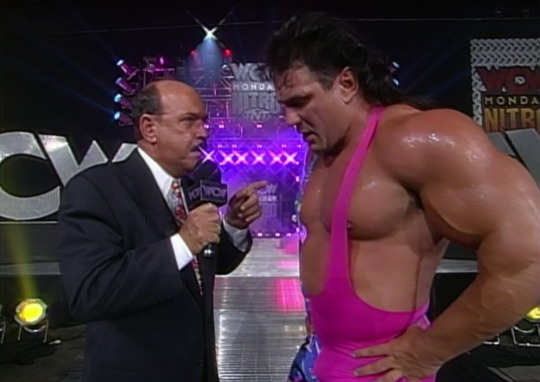
Steiner’s arm is legit bigger than Gene’s head. It might even be bigger than his own head.
Mean Gene notes that the Steiners will be facing Fire & Ice in a match where somebody must win. I assume that means no DQ.
Steiner concurs and is about to launch into a verbal beatdown of his opponents, but before he can do so, he’s interrupted by Debra McMichaels, wife of Steve McMichaels.
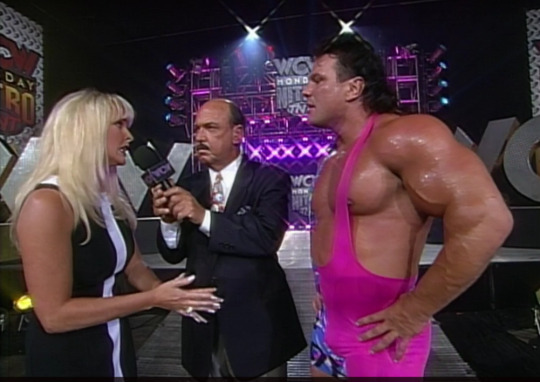
Gene’s face here cracks me up. That’s such a “why aren’t you in the kitchen?” face. Cold.
Anyhow, Debra says that she needs Mean Gene’s attention and basically tells Steiner to go away. And he does. Unusually amicable.
Debra tells Mean Gene she can’t sleep, and is worried about the upcoming match. She’s worried that her husband “Steven” will get really angry and hurt somebody permanently. She feels bad because she thinks it’s her fault.
Gene suggests it isn’t her fault, and Flair has form for winding people up regarding their wives/girlfriends. Debra asks Gene if he can arrange a meeting between the teams to settle their differences before the PPV. A stupid request for numerous reasons - why does she think Mean Gene has the power to do this, or the motivation? He’s just an interviewer. Gene is cracking me up again though.
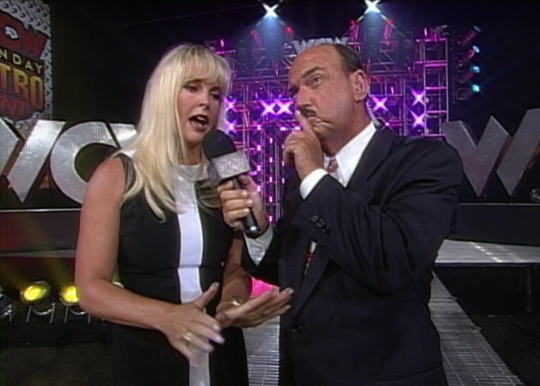
What’s with this facial expression - is he shushing her?
Mean Gene says he’ll try to get Heenan to get the teams together. Yeah, I’m sure that will work out well.
Jim “Jobber” Powers comes running out with a determined look on his face, so I guess we’re onto the next match.
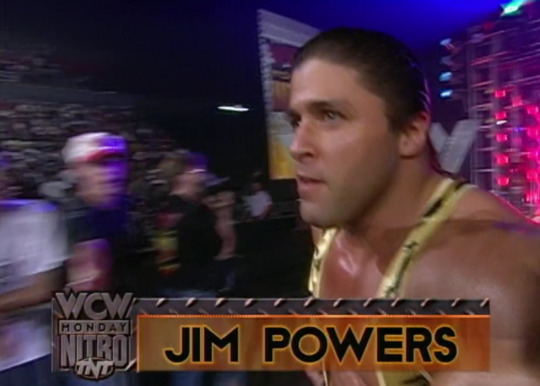
Then we see this shot.

This type of thing is fine as long as the kids are in the right order. If the kid at the end isn’t there the other two are just advertising a bathroom though.
Powers’ opponent is heel DDP.

Schiavone calls DDP the “Lord of the Ring”, which fortunately never became an official nickname.
Jim Powers Vs DDP
Powers looks a bit like tarzan. Powers starts off well, but DDP soon takes control. Powers makes a strong comeback, but then...

Bang. Diamond Cutter, game over. It’s weird hearing so little pop for this move.
DDP beats Jim Powers by Pinball.
After the match, DDP calls himself the Lord of the Ring. Almost as bad as the Ringmaster.
We’re given a promo on the issues between Chris Benoit and Kevin Sullivan.

Sullivan tries to look demonic (I think?) but ends up making a derp face.
When this promo finally ends, we’re backstage with Mean Gene and US Champ Konnan.

They both look thrilled to be there.
Konnan is facing some guy called “El Gato” on Sunday, who Konnan says is a “legend of legendary proportions” in South America. I’m pretty sure this is a lie, as he’s talking about Pat Tanaka, who is most famously known for using Goldberg’s music before Goldberg used it.
Konnan finishes the promo speaking in Spanish whilst Mean Gene gives another look which has me laughing.
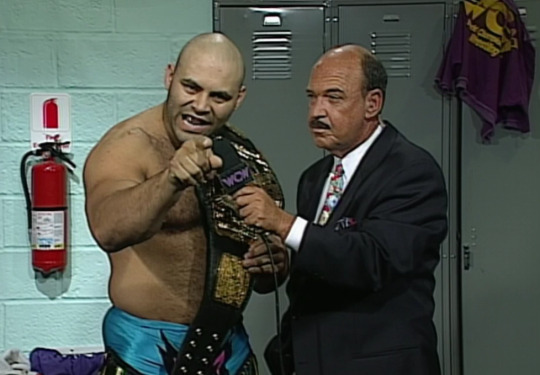
“What chu talkin’ bout, Konnan?”
We’re going back to the ring, where Meng is making his entrance.
Larry says that every challenger for the US belt should have a Green Card. It’s actually a fair point, as they’d presumably have to get one if they won the belt and had to defend it regularly.
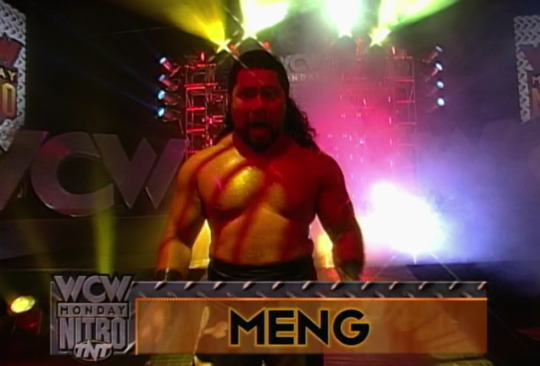
His opponent is a man called Sting...
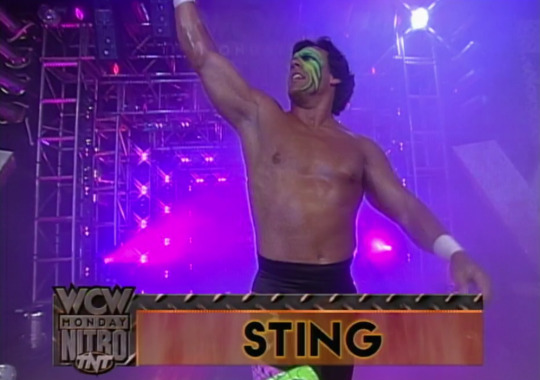
The announcers are still talking about that back-hand bitch slap that Regal gave Sting. Apparently this was hugely humiliating for Sting. They say Regal will be on the program in a return match against Billy Kidman. I was hoping they were going to say Junior Adolf.
Larry mentions that Steve McMichaels may have sent Debra out to purposefully try and get the match on Sunday cancelled. Yes, they’re back on this again. Schiavone says this is nonsense, but honestly, it sort of makes sense. Mongo clearly realised last week he was teaming up with an utter imbecile.
Meng Vs Sting
Meng backs Sting into the corner and then literally just starts smacking him in the face over and over, until they’re in the middle of the ring.
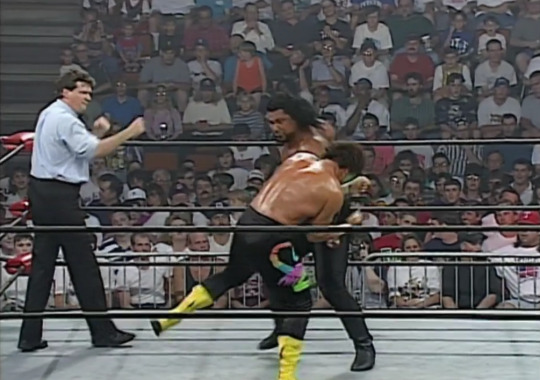
Meng does not give one fuck. Larry calls Meng a “human vegomatic”. I do not know and do not want to know what he means by that. He also says that Meng is not the kind of guy you want to “send a telegram to”. He doesn’t expand on why.
Sting hits a back body drop but then misses a drop kick off the ropes. Meng hits an elbow drop and then chokes Sting, before getting up and stomping him into the mat. This is a pretty brutal beatdown. Sting does eventually manage to take control and knocks Meng down with a series of clotheslines.
After some more back and forth, Meng decides to go to the top rope. This doesn’t work and he ends up getting crotched and falling to the mat. Sting locks in the Scorpion Deathlock.

And this one is over.
Sting defeats Meng via Submission.
For some reason Schiavone sounds stunned that Sting managed to beat a mid-card tag team wrestler. “And Sting wins AGAIN!” ... I’m not sure why he sounds so surprised. Sting wins most of his matches. The guy’s a former world champ and current Tag Team champ. Why the shock that he won a match?
Regal is coming up. Always entertaining.
Mean Gene is out the back with Debra and Heenan.
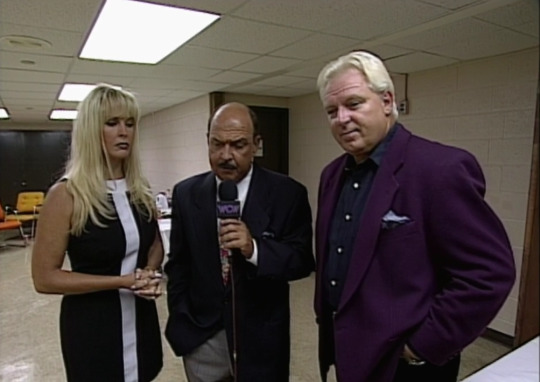
A sombre scene.
Heenan insinuates that Debra has been talking to Flair all week and all night, which she denies. He says “you want to talk to Flair? Follow me, toots”, and they walk through a door. Flair is inside with Woman and Liz. Heenan for some reason slams the door shut, and then we hear screaming.
Debra comes running out looking dishevelled, and suddenly there are a couple of jobbers in the hallway.

Flair and Anderson lay a beat down on them. This is apparently Joe Gomez and Renegade. An unfortunate coincidence that they just happened to be around, I guess.
Back to the action, and out comes “Squire” Dave Taylor along with Jeeves.

I’m not convinced Dave is a legitimate squire.

This kid is not impressed, nor is the dude beside him wearing the wifebeater and the big glasses.
Dave Taylor’s opponent is “Hacksaw” Jim Duggan.
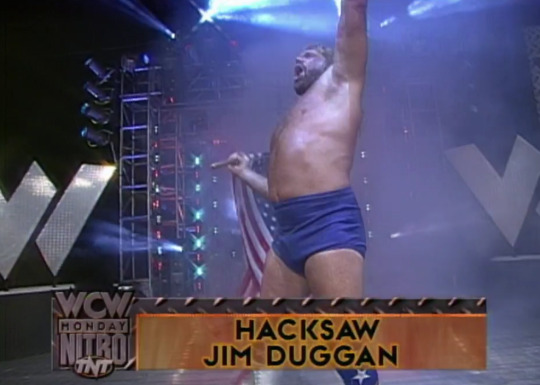
Tony says that he’s getting word that there are people willing to wrestle in place of Renegade and Gomez, who apparently are too badly injured to compete. What a shame.
Dave Taylor Vs Jim Duggan
Duggan yells “hoooo” as he beats up Taylor. He starts a “USA” chant. Standard stuff for Hacksaw.
The announcers are very quickly informed that the Horsemen will now be facing Luger and Sting for the tag team titles. A slight improvement to the main event, to say the least. Sting’s pulling double duty tonight.
Meanwhile, Hacksaw and his gut start clapping and dancing around the ring.

The crowd are thrilled.
Taylor takes control of the match and chokes Duggan on the ropes. Duggan comes back and hits a clothesline, but Taylor gets a foot on the ropes. Inexpicably, Taylor does this whilst Hacksaw pulls the customary tape from his tights and wraps it around his hand.
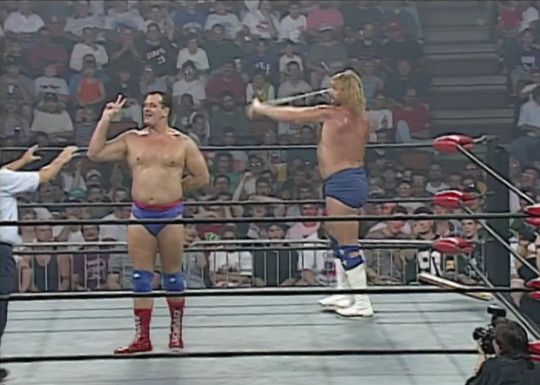
Hacksaw smacks Taylor across the skull with his Tape of Doom, and gets the pin for a mercifully quick win.
Jim Duggan defeats Dave Taylor via Pinfall.
We get a brief Mysterio/Malenko promo, then cut to a recap of John Tenta’s infamous “I’m not a fish” promo. Gene narrates by saying “that was the announcement, he was not a... not a fish”.
We cut backstage where Gene is with Big Bubba and Jimmy Hart.
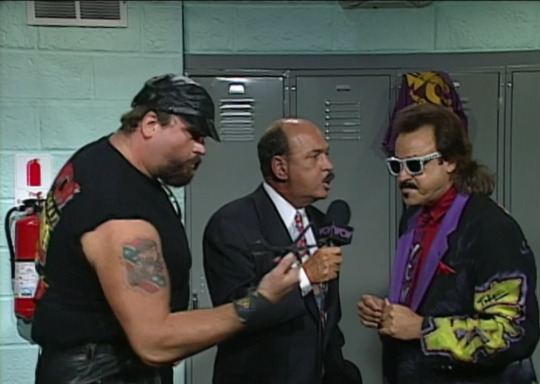
Bubba is playing with scissors. Don’t try this at home kids. Or try to copy Bubba’s look.
Hart tells Tenta that if you don’t pull your own weight in the Dungeon of Doom, you suffer the consequences. In Tenta’s defence, that’s a lot of weight to pull.
Bubba says “Big John Tenta, you say you’re not a man, you say you’re not a fish any more, that you’re a man” ... not a great start. Bubba says that cutting Tenta’s hair proved he’s half a man, and that “the whole world” has been laughing at Tenta behind his back for years. This is not a nice thing to say to a guy who is clearly already pretty paranoid. Bubba says he’s going to leave Tenta laying like “the big whale” he is and sweep him out with the trash. Seems like a missed opportunity to make a beached whale reference, but whatever. Gene quips “nice beard” as Bubba walks away. Snide, especially coming from a guy with dat tasche.
Back in the arena, Gene is up again. He’s all over the show tonight. He introduces Scott Norton, “the flash”. Considering Norton’s lack of speed I have to assume his nickname does not refer to the superhero.

Footage of Norton being chokeslammed last week airs. Gene says he needs to remind Norton of this, as if he’s already forgotten.
Norton says he took the chokeslam twice and he’s back because he doesn’t care and he isn’t scared. A good attitude to have.

Colour co-ordinated. Sort of. We’re forty seconds away from the second hour, so Norton has to stand around and wait until the countdown ends and the fireworks go off. It would be kind of silly if they started going off during the Giant’s entrance, I suppose.
We switch to Bischoff and Heenan on commentary as the second hour begins.

Out come Jimmy Hart and the Giant, who despite being world champion is pretty far down in the pecking order as far as overall importance goes. Bischoff calls Heenan “coach” and Heenan says “you can call me whatever you want, but always call me a winner”. Not whatever you want, then.
The Giant Vs Scott Norton
This match does not last very long. Norton gets pounded in the corner, then hit with a powerslam. Giant chokes him in the corner with his boot. Norton makes a very brief comeback before running himself into a pole on the outside and getting chokeslammed.

Match over.
The Giant beats Scott Norton via Pinfall.
After the match, Lex Luger comes out and gets into it with the Giant. In case you’ve forgotten, he has a title match against the Giant at the PPV. The announcers certainly seem to have forgotten.

Luger is tossed outside. Up until this point I hadn’t noticed the VIP area, but yes, it had been set up. Giant decides to destroy it.

Good.
He tries to Chokeslam Luger through the table, but Luger gives him a low blow, cracks him over the head with the champagne holder and gets the fuck out of there. Giant is pissed.

“LUGERR!!!”
Giant storms to the back. Apparently he didn’t see Luger head up to the announcer’s booth.

Luger says the gloves are off and the rulebook is out the window. He’s got a lot more surprises for the Giant and will see him at the PPV.
Billy Kidman is out next and he’s just super excited to be there.
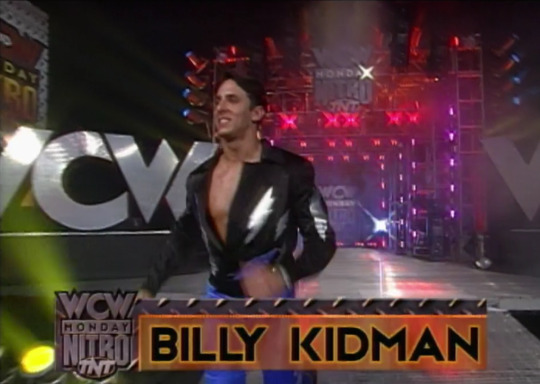
His opponent is Lord Steven Regal, who in contrast looks like he just shit himself.

Steven Regal Vs Billy Kidman
Regal gets into the ring and beats the piss out of Kidman. He recieves a dropkick to the back of the head and Kidman goes up to the top, but misses a splash. Kidman quickly submits to whatever this is.

And the match is over. Squash.
Steven Regals beats Billy Kidman via Pinfall.
Sting suddenly appears, knocks Regal down, points at him and leaves.

Humiliation avenged, I guess? Heenan says Sting must have had “a roll of ten dollar notes in his hand”. Definitely not the case and not sure how that would have helped.
The Nasty Boys make their way out...
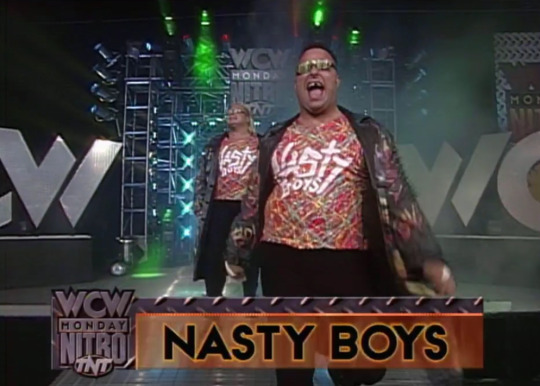
Public Enemy come running out and immediately begin a brawl.
The Nasty Boys Vs Public Enemy
This match lasts for far longer than it should.
Match ends when Knobbs hits Rocco Rock with a trashcan and the match ends in disqualification. Moving on.
Public Enemy beat the Nasty Boys via Disqualification.
There is a promo video for Hulk Hogan. We then get a promo of Greeen/Mongo Vs the Horsemen, as if the announcers haven’t been going on about it literally the entire program. There’s some bizarre hillbilly music playing in the background. It makes the whole thing seem like a joke, which is strange as this is supposed to be a serious match. It’s like they found some background music for the Dukes of Hazzard and said “fuck it, that’ll do.”
Sting’s music hits, and out come the first team for the main event...
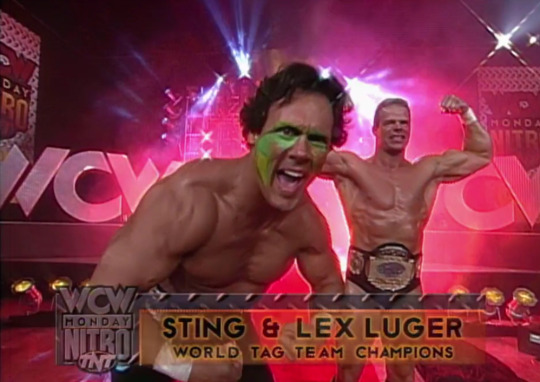
Their opponents are, of course, Flair and Anderson, accompanied by Woman and Liz.
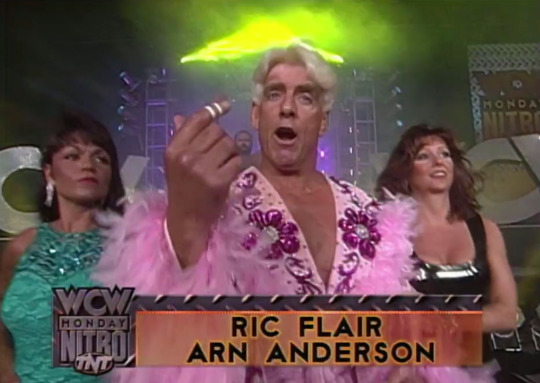
As usual, Arn is way back in the background. Flair yells at the camera “you know what they say Macho Man? They say lonely women make great lovers”. Probably true, but I’m not sure that’s a common saying.
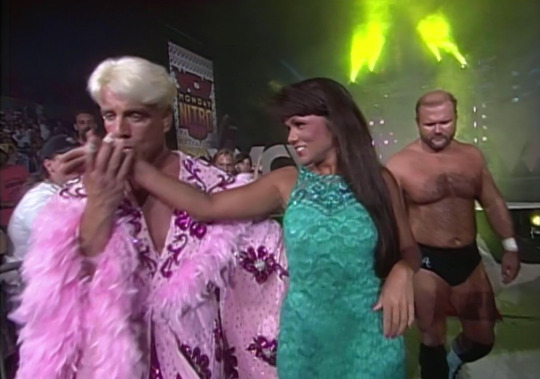
Arn is checking out dat ass.
Bischoff recaps the situation for anybody who’s “just joined us”. Considering the show is basically over it’s a bit late to tune in. WCW seems to think a lot of its fans are extremely forgetful.
Luger & Sting Vs Anderson & Flair
Flair walks over and shoves Sting, who returns the shove and causes Flair to go tumbling over.

Arn is not impressed.
Luger and Flair start the match. Flair gives Luger some chest chops in the corner, but Luger no sells this and gives Flair a gorilla press slam followed by a couple of clotheslines. Anderson comes in and gets decked as well. The Horsemen roll outside and regroup. One of the fans does this weird hand sign and yells “booooo” at Flair...
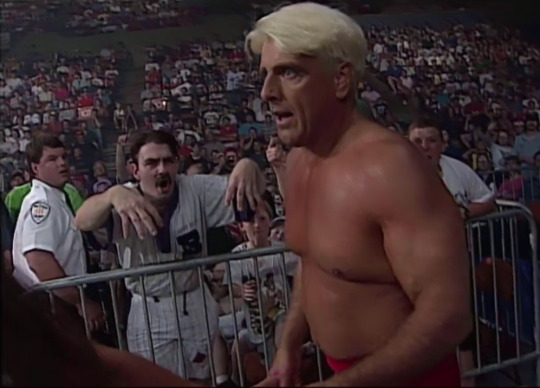
Who totally ignores him. This is the correct course of action.
Flair gets back in the ring and the camera zooms in on Liz.

Lovely... hair.
Back in the ring Flair gets knocked down again and is hit with another gorilla press slam as Woman screams “RIIIIIC!”
Flair does his trademark flip over the turnbuckle and runs into Sting, who decks him on the apron.

KO.
Luger suplexes Flair back into the ring and then attempts and elbow drop, but Flair manages to roll out of the way. I don’t think Flair has hit any actual offence yet. He tags in Arn Anderson, who briefly attacks Luger before also getting knocked down. Luger tags in Sting, and Arn wants no part of that.

Bischoff asks for people to send pictures of their Nitro Parties to WCW. This is the start of something dreadful.
Anderson comes off worse against Sting and gets face planted. Flair runs in and eats his third gorilla press slam, this time from Sting.
Flair runs out to grab a chair from the VIP section...

Then proceeds to drop it. OK.
Flair and Anderson are regrouping outside again. The match has been a total fail for them thus far.
We go to a commercial, and when we come back Sting and Luger are still in control of the match, beating on Anderson. Flair is tagged back in.
Flair knees Sting in the gut and tries those chops to the chest in the corner, which once again do not work. He might want to reassess using this as an attack. Sting attempts to hit a Stinger Splash, but misses.

Bad times. Flair goes up to the top turnbuckle. This quite literally never ends well for him, and once again...

Fail. For a veteran, Flair sure makes a lot of the same mistakes over and over again.
Sting hits a clothesline from the top rope and gets a two, but Arn breaks it up. Momentum stays with Sting and Luger, as Sting hits a superplex on Flair. Arn once again breaks up the pin, and Flair uses the distraction to rake Sting’s eyes. Arn is tagged in and chokes Sting on the ropes. Arn hits his patented spinebuster and gets a two. Luger comes in to break up the count, but is so slow that Sting had already kicked out by the time he got there. Focus, Lex.
Arn attempts to jump on Sting, but gets a couple of knees to the groin...

His face says it all.
Flair is tagged back in. He chops Sting to the mat and gets a two count. Sting reverses a back suplex and nearly gets a pin. Flair goes for the Figure Four but gets rolled up. The referee is for some reason more interested in Luger, who’s just standing on the apron. By the time he gets to the count, Flair kicks out at two.
We go to another commercial break.
When we come back, Sting is being whipped into the guard rail on the outside by Flair. They get back into the ring and go into various unsuccessful pinning combinations, before Anderson is tagged back in. Anderson tries to hit a vader bomb on Sting, but gets knees to the gut.
Flair is tagged back in, just as Sting manages to tag in Luger. Lex beats on Flair and gives him a fourth gorilla press slam. Flair and Anderson try to double team Luger, but end up getting knocked over the ropes.

Weeee! By the way, in WCW it was supposed to be a rule that going over the top rope meant a disqualification. This was generally ignored.
After what seems to have been an unnecessarily long search, the Giant has finally found Luger.

Luger eats a forearm, but then Scott Steiner comes out to get involved.

Because, why not?
Luger, Sting and Steiner beat on the Giant. Jimmy Hart gets between them and begs the Giant to leave. Giant sees sense and walks away. Bischoff says the crowd are chanting “Luger, Luger”. They are definitely not.

Mean Gene is out sticking his beak in everybody’s business again. Giant yells that Luger is a dead man. He promises that Luger will leave the PPV on a stretcher. Ominous.
Luger & Sting Vs Flair & Anderson ends in a No Contest.
We cut back to the announce booth, where Bischoff tries to recap what’s just happened. Rather than go along with this, Heenan launches into a rant about how Macho Man won’t lay a hand on him. He stops short and scampers, because...
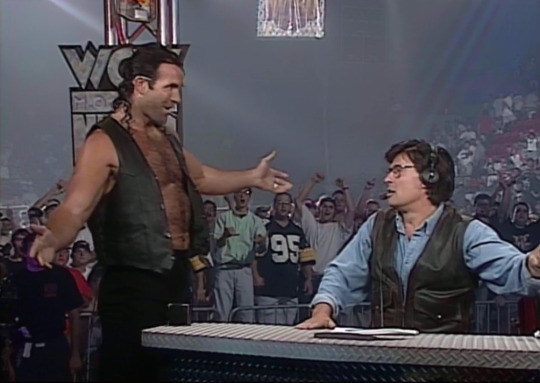
Scott “not Razor Ramone” Hall has shown up.
Bischoff grabs a microphone and says he doesn’t want any trouble, but then goads Hall about the “big surprise”, asking where it is.

There it is.
For some reason, Bischoff completely ignores Hall’s pointing and only reacts once Kevin Nash grabs his shoulder and spins him around. Nash grabs the microphone.
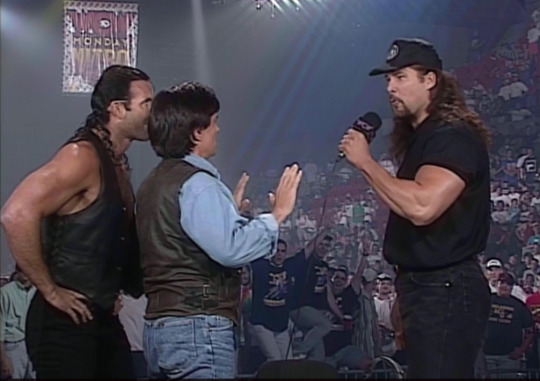
“You’ve been sitting out here for six months, running your mouth. This is where the big boys play, huh? Look at the adjective, “play”, we ain’t here to play. Now he [Hall] said last week that he was going to bring somebody out here. I’m here. You still don’t have your three people, and you know why? Because nobody wants to face us. This show is about as interesting as Marge Schott reading excerpts from Mein Kampf.”
Another Hitler reference. Did Regal help write this promo? Bischoff says he wants no trouble, and Nash replies “yeah, no trouble, because I’ll kick your teeth down your throat. Where’s your three guys? What, you couldn’t get a paleontologist to get a couple of these fossils cleared? You ain’t got enough guys off a dialysis machine to get a team? Where’s Hogan? Where’s Hogan? Out doing another episode of Blunder in Paradise? (ouch!) Where’s the Macho Man, huh? Doing some Slim Jim commercial? Hey, we’re here. You wanna say something?”
Nash shoves the mic in Bischoff’s face. Ken Doll takes the mic and says he doesn’t have the authority to do anything now, and if Nash wants a fight, it isn’t with him. He tells Nash that tomorrow morning at nine o’clock he’ll be in the offices in Atlanta and he’ll try and get them their fight.He tells them they can show up at the Great American Bash and they might get a fight.
Hall and Nash say that they’ll be there. Nash says “bring what you got. The measuring stick just changed around here buddy, you’re looking at it.”
Nash then shoves the microphone into Bischoff’s chest so hard he falls back onto the announce desk. Hall and Nash mug to the crowd as Bischoff makes the sign to cut the program.

An excellent promo from Nash here. At the time a lot of his references went over my head, as I was so young, and I still had to google Marge Schott. This was a sign of things to come, as Nitro began to move away from its standard format and into a more chaotic era.
1 note
·
View note
Text
Thinking Is Expensive. Who’s Supposed to Pay for It?
Google spent nearly $5.4 million on lobbying in the second quarter of 2017. (Photo: Vladislav Reshetnyak/Pexels)
Our latest Freakonomics Radio episode is called “Thinking Is Expensive. Who’s Supposed to Pay for It?” (You can subscribe to the podcast at Apple Podcasts or elsewhere, get the RSS feed, or listen via the media player above.)
Corporations and rich people donate billions to their favorite think tanks and foundations. Should we be grateful for their generosity — or suspicious of their motives?
Below is a transcript of the episode, modified for your reading pleasure. For more information on the people and ideas in the episode, see the links at the bottom of this post.
* * *
I’m sure you’ve been hearing the ever-more-anguished calls to regulate the huge tech firms collectively known as GAFA: Google, Amazon, Facebook, and Apple.
Barry LYNN: These companies, these super-large platform monopolists, they have developed the capacity to manipulate us, to control us, to control the information that is delivered to us, to control the pricing at which products are delivered to us, to control us as producers.
The GAFA companies are far bigger, richer, and arguably more dominant than tech companies in the past. Google, for instance, has more than 80 percent of global search-engine market share. Facebook has nearly 2 billion monthly active users. Amazon has an estimated 90 million prime members in the U.S. — that’s something like 70 percent of all American households! It’s estimated that 40 percent of all online spending goes to Amazon. This kind of scale creates a lot of concern. We’ve examined this concern in previous episodes, like “Who Runs the Internet?” and “Is the Internet Being Ruined?”
Zeynep TUFEKCI from a previous Freakonomics Radio episode: We’re seeing the birth of a new center of real power. We depend on these technologies that have been, in many ways, wonderful and fascinating. But they’re making significant decisions unilaterally.
There’s also the question of whether the mission of these firms is as socially beneficial as many people believed they were in the early days of the internet:
TUFEKCI: There’s all these really smart engineers. They’re the brightest computer scientists, and all they’re thinking about is, “How do I keep someone on Facebook for 10 more minutes? What’s the exact combination of things that will keep them staying on the site as long as possible so that we can show them as much advertisement as possible?”
So here’s a question: if you were one of those huge, dominant, super-wealthy firms, what would you do to ensure that the good times stay good? You’d probably spend a lot of money lobbying politicians — which, yes, they do. There’s been a huge ramping-up lately in lobbying by tech firms. But you might also do something a bit subtler than that.
Robert REICH: Yeah. There’s been a parallel ramping-up of the philanthropy that’s associated with the tech firms. That philanthropy comes in a variety of different forms.
Today on Freakonomics Radio: corporations using philanthropy to shape the public debate — and how that can go terribly wrong:
Barry LYNN: That was on June 27th. And on June 29th, I was told that my entire team had to leave.
* * *
Our story today begins with a journalist …
Franklin FOER: I’m Franklin Foer, a writer with The Atlantic.
Stephen J. DUBNER: You are one of three brothers who write books. Talk about that for just a minute, and the family that produced all of you.
FOER: Right. So I have two brothers: Jonathan, who’s written a good number of novels, including Everything is Illuminated. I got a younger brother named Josh, who is a science writer [and] wrote a book called Moonwalking with Einstein. It’s actually incredibly uncomfortable for us to talk about growing up in a family of other writers just because— I’m sure in some ways, we benefit from the novelty act of being three brotherly writers. But then we all, of course, want to be known for our own accomplishments.
DUBNER: Right.
FOER: But our parents didn’t do anything— They didn’t force us to play violin four hours a day or sit down and study the great chess masters. We watched a lot of He-Man and Addams Family reruns on television when we were growing up. But one of the things that they did was they gave us a credit card, which they said we weren’t allowed to spend essentially on anything except in the event of an incredible emergency. There was one exception to this: they said that we could basically spend the credit card at will at the bookshop. They basically guided us to one thing.
DUBNER: Your first job in journalism was at Slate, one of the very first mainstream online publications, which was started by Microsoft. There was this huge enthusiasm, certainly among the chattering classes.
FOER: There was a certain amount of utopianism that was associated with the emergence of the internet, this idea that we were going to tie the world together. I love search engines. I love the fact that I can access every book in human history in a nanosecond. I love that I can get things delivered to my door incredibly quickly. These things, arguably, make life much better; maybe inarguably make life much better. These technologies were incredible! Amazon is an incredible company. The Kindle was an incredible invention. The iPad and the iPhone were incredible innovations. We were right to marvel at them.
DUBNER: After writing for Slate for a while, you moved on to the New Republic — as you call it, the “intellectual organ for hard-nosed liberalism.” You ultimately became editor there not once, but twice.
FOER: The New Republic was this little magazine that always had outsized influence in politics and culture. It was an incredibly elitist organ and it managed to persist over a hundred years while never really turning a profit. As we entered the Internet Age, that became a more and more difficult thing to continue to do. We ended up shifting from one ownership group to the next. I got so exhausted trying to find an owner and sick of that, I ended up resigning as editor. But then a couple of years after I resigned, the magazine got bought by a guy called Chris Hughes who had been Mark Zuckerberg‘s roommate at Harvard, and co-founder of Facebook. He bought the magazine and, to me, this seemed almost too good to be true. You had this guy who understood social media, who had incredible number of resources, and seemed devoted to this little magazine that I was also devoted to. So I came back, I edited the magazine, and Chris and I tried to re-make it.
DUBNER: The relationship in the beginning seemed like it was unbelievably good.
FOER: We became really good friends and it was exhilarating. We felt like we were trying to save something that was imperiled in the world and that maybe we could help provide some dignified solution to the rest of journalism, which was grappling with a lot of the same issues that we were grappling with. But there was a moment when things just took this turn. Chris had always talked about wanting to make a profit with the New Republic, and he suddenly decided that he didn’t want to lose, at least not a whole lot of money with it. So we had to turn around our financial position incredibly quickly. He insisted that we start chasing clicks. In 2013, the surest way to get clicks was to post a clip from last night’s Daily Show with Jon Stewart. You slap a headline on it and maybe write a couple sentences about it and everybody would click on it.
DUBNER: You got caught up in, at least, monitoring the numbers, right?
FOER: Yes, I did. Look, data is crack cocaine. If you’re the guy who had a hard time getting a date in high school, to suddenly find yourself producing things that are extremely popular — you become obsessed with replicating that popularity. In some ways, everybody in the magazine wanted to be successful on Facebook. We wanted to master social media and this new environment. But we didn’t want that new environment to dictate how we did our jobs.
DUBNER: All right, so we should say that [you were] quitting as you were about to be fired from the New Republic.
FOER: Yeah. I took the brave decision to resign when I learned that there was some guy who already had my job and was offering other people jobs at the New Republic.
DUBNER: It’s funny. You’re describing what was happening to you at the New Republic. But it sounds as though you’re also perhaps describing your view of what happened at places like Google and Facebook over time, where you may begin with a certain set of motivations, but as those motivations lead you to this overwhelming commercial success, you’re so seduced by the magnitude of that success that you can’t help but want to replicate it over and over again.
FOER: Yeah, that’s completely right. In retrospect, I realized that I was living this compressed version of recent history.
The recent history of the internet at least. Over the years, Franklin Foer’s views of the internet had shifted. The same guy who used to think this …
FOER: There was a certain amount of utopianism associated with the emergence of the internet.
And this:
FOER: I love search engines!
And this:
FOER: These technologies were incredible! Amazon is an incredible company.
Has now come to think this:
FOER: Amazon thinks of itself as “the everything store.” It’s gotten itself in pretty much every conceivable business. It owns Whole Foods, it powers the cloud, it houses data for the C.I.A., and so on. There’s really nothing that it doesn’t try to squeeze into its empire.
He also thinks this:
FOER: As Facebook shapes the way that we consume news, as Google shapes the way that we interact with information, and as Amazon has shaped the way that we interact with books, the dominance that these companies exert ends up trickling through the cultural intellectual ecosystem. With Amazon, my concern is that the book business has become utterly dependent on them, that they hold one of the few true monopolies in the world.
Actually, that’s not quite true.
Swati BHATT: My name is Swati Bhatt. I teach at Princeton.
One course she teaches: The Economics of the Internet.
BHATT: The existence of a monopoly — of a single firm in any product space, unless it’s a government-granted monopoly — is rare in the digital economy.
So even though Amazon has, for instance, at least 70 percent of e-book sales, that doesn’t make it a monopoly.
BHATT: Technically, no. Because that leaves 30 percent for some other set of firms.
When describing firms like Amazon, Google, and Facebook, Bhatt prefers the term “behemoth.”
BHATT: Yes, there is a difference. “Behemoth” suggests that it’s simply a large firm, whereas a “monopoly” suggests that it’s the only firm.
Okay, economic semantics aside: Bhatt does see strong parallels between these modern behemoths and what we traditionally think of as monopolies. But a modern tech behemoth has a particularly modern advantage:
BHATT: Ownership of a scarce resource is the definition of a natural monopoly. What we’re seeing with the behemoths today is an ownership of a scarce resource called “personal data” or “data” in general. There’s an interesting self-reinforcing dynamic here. Whereas a firm transacts, buys and sells, [a behemoth] acquires data about its consumers. That enables it to grow by producing more personalized products by advertising more effectively. That brings in more customers, which brings in more data, which then enables the firm to grow even further and that leads to the behemoth status.
And that is what Franklin Foer, and a growing chorus of other critics, are so concerned about. Foer recently published a book called World Without Mind: The Existential Threat of Big Tech. It’s part-memoir, part-screed against the dominance of the big tech firms. It’s not a particularly empirical book; and it’s hard to say how much of Foer’s argument was informed by personal experiences, like the New Republic disaster. It also turns out that Foer’s family, in addition to encouraging his love of books, encouraged his distrust of monopolies.
FOER: My dad was a University of Chicago-trained lawyer who’d worked in the antitrust division of the Carter administration. I grew up in this household where antitrust was part of the family religion. My dad would drive around in a car that had a bumper sticker that said “bust the trust” on it. It was a real obsession and passion of his. For a long time he was this lonely activist who was railing for greater, more aggressive enforcement of these laws prohibiting monopolistic behavior. I always admired him for this quixotic stand that he took, but I never really fully bought into his arguments until Amazon got in this fight with the book publishers, when it started to hit close to home.
DUBNER: This was the Hachette deal, yes?
FOER: Exactly. Let’s just say something about book publishing, which is that book publishing is an incredibly oligopolistic industry. There are four or five big companies that dominate book publishing. They’re oftentimes jerks. It’s hard to have a whole lot of sympathy for the book publishers. But suddenly you have these five big companies that were up against one big company, which was Amazon. Amazon basically controlled their access to the marketplace. Amazon was renegotiating their ebook contract with the publishers one by one, trying to strong-arm them with their market power into pricing their books lower and lower. To me, it was grotesque and ominous that Amazon was able to use its market power to try to dictate to the publishers in this incredibly aggressive way.
DUBNER: Where do you draw the line between winning — or competing — and being evil?
FOER: Right.
DUBNER: Persuade me that it’s not just a case of big companies being really good at what they do and winning and you having sympathies with the people who are not winning.
FOER: My book, in some ways, is a valentine to competition. I believe that a marketplace is most healthy when you have a number of market players. I might not love book publishing. It might be too concentrated in some ways for my taste. But at least there are five companies competing against one another for the marketplace. If I don’t like the way that one company is treating me, I can always go to another company. Or if I don’t like the goods that one company is selling, I can go to another company. The problem with Amazon, and the problem with Google, and, to an extent, with Facebook, is that they become the only market player. The choice that we have as consumers is limited and competition is limited. My argument is against the big technology companies, which are racing to expand into every nook and cranny of our lives.
As it happens, this expansion had just raced into Franklin Foer’s own life. We spoke to him in early September, just before his book was to be published. And there had been a plot twist.
FOER: The New America Foundation supported my book.
The New America Foundation is a center-left think tank devoted to “renewing American politics, prosperity, and purpose in the Digital Age.” It’s run by the political scientist Anne-Marie Slaughter, who’s a former top official in the Obama State Department.
FOER: One of the cool things that New America does is that they give money to journalists who are writing book projects. I didn’t get a lot of money from them, but I got a small sum. They were especially generous to me because I’d just been fired from a job at the New Republic.
And the partial funding of Foer’s book about the dominance of firms like Google suddenly became relevant because—
FOER: That’s since become relevant just because they fired a vociferous critic of Google from the foundation. Which is noteworthy because the foundation has received a fair amount of money from Google chairman Eric Schmidt.
DUBNER: Right. How much fun is it for you to be publishing a new book and already distancing yourself from the foundation that funded the writing of it?
FOER: It actually doesn’t feel good because New America has been supportive of me over time. I’d rather not seem like a jerk and disavow them when they’ve been so nice to me. But this does feel sadly reflective of a much bigger issue.
DUBNER: Who was the critic who was fired?
FOER: His name is Barry Lynn and he ran something called the Open Markets program there. Very active opponent of monopoly and a very vociferous critic of Google.
LYNN: We used to have an affiliation with the New America Foundation, but that ended on August 31st. We were kicked out of New America.
And that is Barry Lynn.
LYNN: And I direct the Open Markets Institute.
So the name of his project has not been taken away; but his affiliation with the New America Foundation has.
LYNN: We’re working out of a WeWork on the 1400 block of G Street in Washington.
Coming up on Freakonomics Radio: the story is not as neat as the headlines would have it:
Anne-Marie SLAUGHTER: At no point did Google or any funder tell me to fire Barry Lynn.
Also: funding controversies can reach across many decades. Like all the way back to the founding of Stanford University.
REICH: There is an effort to unearth the sordid history of the university’s initial benefactor.
* * *
Barry Lynn started out as a journalist …
LYNN: I worked in Venezuela and in Peru as a foreign correspondent. Then, I ran a magazine called Global Business Magazine.
We should say it was a pro-business magazine.
LYNN: We were a magazine that aimed at the people who ran businesses. We had a[n] inside look at how globalization actually works at the institutional level.
That inside look led to Lynn crossing over to the other side. He came to believe that corporations are too powerful, and that their power is too concentrated. This was a theme he pursued in a couple of books and, since 2002, with the New America Foundation. His project came to be known as Open Markets.
LYNN: We got the work going. We did it with increasing effect over the last seven years, to the point where in 2016, we had a number of folks on the Hill starting to understand that, indeed, America has a monopoly problem. The first person who really reached out and said, “I want to actually help shine a light on this problem,” was Senator Warren. The result was a speech that she gave on Capitol Hill.
Senator Elizabeth Warren’s speech was part of a conference, organized by Open Markets, called “America’s Monopoly Problem.”
Elizabeth WARREN: Today in America, competition is dying.
LYNN: This was probably the most important speech about concentration in the United States, about the monopoly problem, since a series of speeches that F.D.R. gave in the 1930s.
WARREN: Google, Apple, and Amazon provide platforms that lots of companies depend on for survival. But Google, Apple, and Amazon also, in many cases, compete with those small companies. That platform can become a tool to snuff out competition.
LYNN: She said, “It’s not just an issue that affects us as consumers. It also affects our democracy, because it’s this concentration of power that leads to concentrations of wealth. Concentrations of wealth lead to concentrations of control over government, and other institutions of authority.”
This line of criticism would seem to be very much in sync with the mission of not only Open Markets, but also its parent organization, the New America Foundation.
SLAUGHTER: In my own scholarship, I’ve written about monopolies and risks of consolidation and data ownership.
That’s Anne-Marie Slaughter, the former State Department official and Princeton professor, who’s now president and C.E.O. of New America.
SLAUGHTER: What convinced me to leave Princeton and become head of New America — which was a big move, because I had a wonderful position at Princeton — was this idea that we really could be a place that hosted fundamental debates about our future in the digital age.
But as Barry Lynn tells the story, New America didn’t share his enthusiasm for the conference he put together where Senator Warren spoke.
LYNN: Well, a few people in my organization at New America were not happy with the way we were framing the conference, and the fact that we were focusing some of our attention on the platform monopolies and especially on Google.
What was wrong with focusing on Google in a conference about monopoly? Remember, they do own some 80 percent of the global search market.
LYNN: Or I guess the question is, “Why was our work at New America problematic for Google?” Eric Schmidt, who is now the chair of the board at Google, was also, for a long time, on the New America board and then for a period of time served as the chair of our board.
Eric Schmidt, who was C.E.O. of Google for 10 years, has also given New America a lot of money, both personally and through his family foundation. So did Google itself. Between Schmidt and Google, New America had received roughly $20 million since its founding in 1999.
LYNN: There was a relationship between our two organizations. This is a relationship goes back to the very early days at New America and actually had never seemed to result in any problems at New America up to this point.
But now, it seemed, there was a problem. Were Schmidt and/or Google leaning on New America as Lynn’s critique of the company grew more intense? A year after the New America conference where Senator Warren spoke against Google’s domination, European antitrust regulators hit Google with a huge fine, $2.7 billion, for allegedly tilting search results in its own favor. Barry Lynn posted a statement on the New America website. It congratulated European regulators for giving Google such a good spanking, and it urged American regulators to do the same.
LYNN: We released this statement in support of the decision in Europe. That was on June 27th. And on June 29th, I was told that my entire team had to leave. We had two months to leave.
One natural conclusion to draw was that Google had stepped in and asked New America to do something about Barry Lynn. Indeed, that’s how it was portrayed in The New York Times. Their headline read: “Google Critic Ousted from Think Tank Funded by the Tech Giant.”
LYNN: At that point I asked for this decision to be reconsidered, and if it could not be reconsidered, I asked for more time. I was told that neither of those was possible.
The writer Franklin Foer, who happens to sit on the board of Barry Lynn’s Open Markets Institute, told us a similar version of events. He made it clear that Lynn’s statement about the European regulators’ decision—
FOER: This was something that was a bit too far for Google. New America was very generous in supporting me, and they never did anything to interfere with my own work. But I was fairly outraged by their treatment of Barry. I can’t resign from New America because I’m not affiliated with them. I’m not taking any money from them now, but I’m extremely disappointed.
But Anne-Marie Slaughter offered a substantially different portrayal. First of all, she says—
SLAUGHTER: No funder at New America has ever influenced New America content in any way.
And, this:
SLAUGHTER: New America has a set of principles on our website that makes very clear that no funding can affect the integrity of our research and/or shape the research in any way. We do not pay to play. We take funding and we do our work. Those two things are separate.
But the timing of Lynn’s firing certainly gave the appearance that Google and/or Eric Schmidt had asked Slaughter and/or the New America Foundation to get rid of Barry Lynn and Open Markets. And Slaughter found herself on the defensive.
SLAUGHTER: At no point did Google or any funder tell me to fire Barry Lynn, and at no point did Google or any funder try to influence the work of anybody here. If any funder ever did tell me that, I’d tell them to take a hike!
That’s Slaughter at a New America event a few weeks ago called “Is Big Tech an Existential Threat?” The event was actually in support of Franklin Foer’s book.
SLAUGHTER: I did not part ways with Barry Lynn for anything to do with Google. I decided that Barry Lynn and I had to part ways because he could not work respectfully, honestly, and cooperatively with his colleagues.
So Slaughter says she got rid of Lynn, not because of a funding conflict of interest, but because he was a difficult employee. That said, she acknowledges a real and long-standing tension between the people who fund research and the people who do research.
SLAUGHTER: I don’t actually think this is just a think-tank issue. I worked at three universities, and universities have private funders for centers and for different bodies of research. Even newspapers have constant tensions between advertisers and reporters that reporters don’t have to navigate, but the management does. There is a general tension wherever you need to protect the integrity of research and you also need to fund that research.
New America says all its major funders are listed on its website. We asked Slaughter for a breakdown:
SLAUGHTER: Only 12 percent comes from corporations. By far, the largest amount comes from foundations and then from private individuals.
LYNN: Taking corporate money does not mean necessarily that the work of the entire institution is suspect—
Barry Lynn again.
LYNN: —but it definitely can create a slippery slope that will lead to pressures being brought to bear on those people who are questioning concentrations of power or the use of corporate power in other ways.
REICH: People are right to have a skeptical, maybe cynical, orientation to corporate lobbying or corporate philanthropy.
And that’s Robert Reich, a political scientist at Stanford.
REICH: My research interests these days focus a great deal on philanthropy and the role philanthropy plays in democratic societies.
And that philanthropy increasingly comes in the form of foundations.
REICH: There are lots of foundations.
DUBNER: What is the median size of assets? It’s really small, right? A million or so dollars—
REICH: Oh yeah, it’s not much. It may be a couple of million dollars. But there’s an enormous growth in the number of foundations, and that’s just a logical consequence of the growing inequality in the United States.
DUBNER: Just talk about your thesis essentially — the role, the influence, and the complications around modern philanthropies.
REICH: I’d start by saying most people’s attitude about philanthropists and about foundations is that we should be grateful that people are trying to do good with their own money. That’s the attitude I want to try to sweep away. I don’t think philanthropists deserve that amount of charity, if you will. Why is that? Because philanthropy, especially large philanthropy, in the form of a foundation or especially wealthy person represents the exercise of power in which they attempt to use their own private wealth to affect public outcomes or to produce public benefits or make social change. Power deserves scrutiny in a democratic society, not gratitude. I’d add on top of that that a foundation, in particular — which is a legal form that allows a wealthy person to create a donor-directed, unaccountable, barely transparent, perpetual, and tax-subsidized corporate form in order to use their private assets to affect the public — is an especially interesting and potentially worrisome form of power.
DUBNER: Let’s talk about think tanks, per se. Is there such a thing as a truly nonpartisan think tank, or is it just too hard because of where the money is coming from?
REICH: Well, I’d say that you’re more likely to make the case that there are nonpartisan universities, universities which are funded in not entirely dissimilar ways from think tanks. Officially, they have to be nonpartisan, so do think tanks. In other words they can’t declare themselves in favor of particular political candidates. But think tanks have become far more popular in the United States as a result of the polarization and inequality in the United States. Idea generation that happens in think tanks — the policy frameworks and proposals that get disseminated from think tanks — flow from philanthropic interests with particular policy positions in mind.
DUBNER: Tell me what you know about Google’s history of philanthropic, foundation, or think-tank giving and especially the timeline because I understand it’s accelerated quite a bit recently.
REICH: Google, like lots of other tech firms, has gotten much more aggressive in its formal lobbying efforts. I think it’s now the case that the top five Silicon Valley companies are amongst the largest sources of lobbying, greater even than the five top Wall Street firms in New York. There’s been a parallel ramping up of the philanthropy that’s associated with the tech firms. That philanthropy comes in a variety of different forms.
DUBNER: Rob, knowing what you know about the situation with the New America Foundation and the Google money and the controversy, what would your advice be for them, for the New America Foundation?
REICH: The New America Foundation needs to be aware of the soft power, the agenda-setting influence that donors can have to the think tank even in the absence of calling someone up and saying “we disagree” or “we object to the work that someone does.” When Anne-Marie Slaughter — whose job is chiefly to ensure the existence of the New America Foundation into the future, which involves fund-raising — does her work, she needs to be cautious that she hasn’t internalized the policy preferences of the donors such that she shapes the work of the foundation around the donor interests. The idea is you’re worried about the conversation you’ll have with your donor in the future. You orient the work that you do to please the donor, rather than to displease the donor. That has, functionally, the same outcome from the donor’s perspective, without even having to say anything.
DUBNER: Now, your own fine university, Stanford, benefited, was founded from the private largesse of a man, Leland Stanford. Most of history paints him as a classic robber baron — a railroad man who did all kinds of stuff that we would frown upon today. Talk to me about that and whether that’s a conversation that takes place regularly at Stanford. Or is it avoided?
REICH: I’d say people here are aware of the history of the university and the deep connection between philanthropy and the well-being of especially wealthy universities. People here, I think, know something about the history of Leland Stanford. There is an effort on campus to unearth the sordid history of the university’s initial benefactor.
DUBNER: Has there been any movement of any magnitude to rename the university?
REICH: Not that I know of. They’re starting with lower-hanging fruit — monuments and places on campus named for people with no obvious connection to the university and whose historical records are not so appealing.
DUBNER: Let’s say I have some money, Rob. I want to set up a foundation. I come to you and I say, “I’m a big believer in bringing critics into the inner circle. I know that you’ve been critical of how foundations behave, and that it’s undemocratic, and so on. But Rob, I’d like to make you the executive of my foundation.” Let’s say I made my money in ammonia fertilizer. How would you go about setting it up in a way that takes advantage of my largesse to try to accomplish something that we could all agree is some public good without falling into all the traps that you’ve been describing to us?
REICH: First, I’d say, despite the fact that laws don’t require me to be especially transparent about what the foundation is doing, I pledge to make completely available to the public all of the grant-making we do, the evaluations of the grants that we make. I’d want to invite in outside experts as well. I would want to find ways in which to organize the foundation’s efforts to seek out the most severe critics of what we were doing in order to try to learn the most in order to give grants away to greater effect.
DUBNER: Let’s say I also make you chairman of the board. Tell me about that board, how you’d set it up. What would the elections look like? What would the terms be like? Who’s on it?
REICH: Well, “elections” already reveal that you don’t know much about how foundations are operating. There are no elections on the boards of foundations. The boards are hand-picked by the initial donor. You can create the governing board of a foundation in such a way as you guarantee that only family members and heirs ever serve on the board. There’s no public representation necessary. The Gates Foundation, with something in the neighborhood of $40 to $80 billion devoted to philanthropy, has as its governing trustees Bill and Melinda Gates, Warren Buffett, and, I believe, Bill Gates Sr. I’d like to see possibly experimentation with a form of foundation peer review in which an effort analogous to what happens in academia happens within the foundation world. It would be surprising if the philanthropic efforts of corporations were purely altruistic. Corporations seek to advance their own interest especially in their lobbying — quite possibly often in their philanthropy. I’m trying to stimulate people to be morally awake and in the same moment, to get people to consider what types of public policies or frameworks ought to govern and structure our collective lives, which is a moral and philosophical question.
That was the Stanford political scientist Robert Reich. We also heard today from Anne-Marie Slaughter, Barry Lynn, Swati Bhatt, and Franklin Foer. Coming up next time on Freakonomics Radio: my Freakonomics friend and co-author Steve Levitt drops by to answer your FREAK-quently Asked Questions:
Steven LEVITT: That is one of the weirdest definitions of social good I’ve ever heard in my entire life—
LEVITT: The thing you want to do, from a public policy perspective, is not put people’s identity and their morality in conflict with efficiency—
LEVITT: As you take the knife and think about whether you’re going to stab the person with it, you’re not thinking about what’s going to happen 15 years later when I apply for a job and I have to check the box—
That’s next time, on Freakonomics Radio.
Freakonomics Radio is produced by WNYC Studios and Dubner Productions. This episode was produced by Brian Gutierrez. Our staff also includes Alison Hockenberry, Merritt Jacob, Greg Rosalsky, Stephanie Tam, Eliza Lambert, Emma Morgenstern and Harry Huggins; the music throughout the episode was composed by Luis Guerra. You can subscribe to Freakonomics Radio on Apple Podcasts, Stitcher, or wherever you get your podcasts. You can also find us on Twitter, Facebook, or via email at [email protected].
Here’s where you can learn more about the people and ideas in this episode:
SOURCES
Swati Bhatt, professor of economics at Princeton University.
Franklin Foer, staff writer at The Atlantic.
Barry Lynn, executive director of the Open Markets Institute.
Robert Reich, professor of political science at the Stanford University.
Anne-Marie Slaughter, president and C.E.O. of New America.
RESOURCES
“America’s Monopoly Problem: What Should the Next President Do?” Elizabeth Warren, New America (June 29, 2016).
“Antitrust: Commission Fines Google €2.42 Billion for Abusing Dominance as Search Engine by Giving Illegal Advantage to own Comparison Shopping Service,” European Commission (June 27, 2017).
How Digital Communication Technology Shapes Markets: Redefining Competition, Building Cooperation by Swati Bhatt (Palgrave Macmillan, 2017).
“Is Big Tech an Existential Threat?” Anne-Marie Slaughter, New America (October 5, 2017).
“Repugnant to the Whole Idea of Democracy? On the Role of Foundations in Democratic Societies,” Rob Reich (July, 2016).
“What Are Foundations For?” Rob Reich, Boston Review (March 1, 2013).
World Without Mind: The Existential Threat of Big Tech by Franklin Foer (Penguin Press, 2017).
EXTRA
“Is the Internet Being Ruined?” Freakonomics Radio (July 14, 2016).
“Who Runs the Internet?” Freakonomics Radio (November 14, 2013).
The post Thinking Is Expensive. Who’s Supposed to Pay for It? appeared first on Freakonomics.
from Dental Care Tips http://freakonomics.com/podcast/thinking-expensive-who-pay/
0 notes
Text
Student story: Louisa – Advertising Unlocked
Mother gives students a whole new definition of creativity
Louisa Dorothea Loehrig, MSc Marketing
Think BIG, thing TV, think attention-grabbing adverts that you can’t zap away. If you’ve lived in the UK (and not in a cave) you would’ve felt EPIC when seeing moneysupermarket’s Dave thrust his bubble butt whilst strutting in fabulous high heels, unconsciously sang along to Boot’s iconic “here come the giiiiiiirls”, and/or thought about how you could become your own interior designer after falling in love with IKEA’s homey solutions. Meet the company responsible for all this: meet Mother.
Along with around 20 other students, I had the amazing opportunity to meet Mother in person – or in the many persons this company is. This was my chance to find out all about how exactly these masterpieces are created. Nothing, not even the miserable rain on the day, could dampen my excitement, and let me tell you – I was not disappointed!
After receiving a warm welcome, coffee and snacks, and taking in the impressive space, we sat down on the big concrete staircase, eager to learn what was to come. Katie Mackay, Mother’s joint head of strategy I was über eager to meet (not just to see her choice of outfit), kick started the event by giving an overview of the company. Pictures of employees’ proud mothers adorned the presentation and the walls next to us – a reminder, not only of the company’s mission to take care of projects as a mother would, but also to make their own mothers proud of their work.
Next, employees from across all positions (strategists, creatives, account managers, executives, TV producers, etc.) introduced themselves, told their story of how they got to Mother, and what their role entailed. The background stories could not have been more diverse, which just showcased Mother’s openness as an employer, and independent agency. The collaboration across all positions and the periodic rotation of seating around the concrete desk gave the impression of a close-knit family.
What stood out most to me was the emphasis on creativity. Yes, of course an advertising agency has to be creative, but at Mother CREATIVITY is spelled in capital letters. Creative ideas are not just confined to the position of the creatives, but everyone’s input is valued and fed into the creative process – even the clients’!
We were then taught how to know if an idea is a goodie, by means of Mother’s own 12 tests:
The samurai intuition test: listen to the instant emotional reaction to an idea – gut feeling
The Chinese meal test: does the idea stick in your brain long after the brief?
The irritation test: does it p*ss you off? i.e. interesting ideas are often provocative
The forehead-slap test: it could be something obvious you just didn’t think of before
The “how are we going to cheat research to get this through” test: some of the best ideas fail initial research tests
The chuck, sh*g or marry test: is the idea good for the moment or will it last over time?
The “is it telling the truth or just lying” test: tell the truth in an unexpected/delightful way
The “oh boy, is Rover going to get it tonight” test: will the idea make people envious that they didn’t come up with it?
The delete or forward test: would you personally share the idea when you come across it?
The Camden Market T-shirt test: is it culture or just an ad? Will the idea take off and be adopted by people in various ways?
(My favourite) The “did it scare the straight man” test: if everyone is comfortable with the idea, it is probably not very good
The Bill Hicks was wrong test: will your wife/husband/kids be proud of you for making the idea happen?
We were then invited to form groups and come up with the next moneysupermarket campaign. We put our heads together and gave it our all to create an ad that was:
Famous
Jaw dropping
And makes you giggle!
Ideas flew across the table in a mad brainstorm and were transformed into a concept within 25 short minutes. Each group then proceeded to present their very own masterpiece. Campaigns went in all directions, from a Star Wars-inspired theme featuring Darth Vader, lightsabers and a “breathe easy slogan”, to Simon Cowell feeling EPIC on the X-factor stage after saving money.
After a round of feedback, the event was wrapped up in the best way possible – with pizza! I would like to take this opportunity to say thank you to everyone involved in the planning and executing of “Advertising Unlocked”: what a fantastic experience!
from QMUL Jobs Blog http://ift.tt/2x0lSkb
via IFTTT
0 notes
Text
The Virginia shooter had a history of domestic violence. That's tragically ordinary.
The shooting at a GOP congressional baseball practice on June 14 was allegedly carried out by a man with a history of violence.
Photo by Alex Wong/Getty Images.
Specifically, violence against women.
Alleged shooter James T. Hodgkinson reportedly dragged his daughter out of a neighbor's house by her hair in 2006, according to The Washington Post. When she attempted to flee in a car, Hodgkinson broke in and attempted to cut her out of her seatbelt with a pocket knife.
This isn't extraordinary. In fact, it's tragically ordinary.
A 2015 New York Times report found that in 57% of mass shootings, current or former intimate partners or family members of the shooter were among the victims.
In incidents that don't involve partners or family — like in the recent attack on the Republican congressmen — the killer still frequently has a history of assault against a female partner or family member.
The kind of mass violence that devastates whole communities and rips apart the lives of strangers often begins at home. For the perpetrators of 12 of the most high-profile mass attacks between 2012 and 2017 around the globe, women were their first victims.
1. Esteban Santiago, who killed five at the Fort Lauderdale airport, was arrested the previous year for hitting and strangling his girlfriend.
Photo by Joe Raedle/Getty Images.
"Santiago verbally assaulted his then girlfriend, a 40-year old mother of one child from a previous marriage whom The Daily Beast is not naming, through a locked bathroom door, telling her to 'Get the fuck out, bitch.' After he forced his way in by breaking down the door, he smacked her in the head and strangled her." — The Daily Beast, Jan. 7, 2017
2. Omar Mateen, the Pulse nightclub shooter, allegedly attacked his wife numerous times, which prompted her to flee and file for divorce.
Photo by Gerardo Mora/Getty Images.
In Sitora Yusufiy's own words: "Once, he woke up to find me on the phone with my cousin and started kicking me. He threatened to kill me if I left him. Another time, I was asleep in front of the TV when he pulled me up by the hair and started slapping me, and then choking me until I gasped for air. He claimed it was because I hadn't done the laundry." — Marie Claire, Sept. 26, 2016
3. Mohamed Lahouaiej-Bouhlel, who murdered 86 people with a truck at a Bastille Day celebration in Nice, France, had been accused of spousal abuse.
Photo by Valery Hache/Getty Images.
"A woman who knows the family told the BBC Lahouaiej-Bouhlel had been thrown out of their home in the Le Ray area of Nice more than a year ago after allegedly beating his wife." — BBC, Aug. 19, 2016
4. Dallas cop-killer Micah Johnson was, allegedly, a serial harasser of fellow soldiers while in the military.
Photo by Spencer Platt/Getty Images.
"Superiors of Johnson accused the deceased murderer of 'egregious sexual harassment,' while he was serving deployment in Afghanistan. They recommended he receive a dishonorable discharge, but for reasons unknown to them, he left the military with an honorable discharge." — Salon, July 16, 2016
5. Cedric Ford, who killed three of his co-workers at a Kansas lawnmower factory in 2016, had recently been served a domestic violence order.
"The order, posted by the Wichita Eagle on its website, was sought by an unidentified woman who had been living with Ford and said he had been physically abusive. She wrote in the order that he was alcoholic, violent, depressed and in need of medical and psychological help." — Reuters, Feb. 27, 2016
6. Robert Lewis Dear, who murdered three outside a Colorado Planned Parenthood clinic in 2015, was accused of abuse by two of his ex-wives and had been arrested and accused of rape.
Image by Handout/Getty Images.
"In the divorce papers, Micheau said Dear threw her around a room by her hair on one occasion and beat her head against the ground. In the affidavit, she said Dear 'erupts into fury in a matter of seconds,' and that she 'lived in fear and dread of his emotional and physical abuse.'" — The Washington Post, Dec. 1, 2015
7. John Houser, who killed two women at a screening of "Trainwreck" in 2015, was accused of "acts of family violence" by his wife, daughter, and others.
Photo by Yuri Gripas/Getty Images.
"Among those listed as wanting protection from Houser were his daughter's fiancé and future in-laws, as well as his wife's aunt. At the time, Houser's wife, Kellie, told police she was so concerned about his propensity for violence that she removed all the guns and weapons from their home." — CBS News, July 24, 2015
8. Ismaaiyl Brinsley first shot his ex-girlfriend before shooting and killing two New York police officers in 2014.
Photo by Jewel Samad/Getty Images.
"Baltimore County Police responded to a call at Brinsley's ex-girlfriend's home in the Baltimore suburb of Owings Mills, Maryland around 5:48 a.m. on Saturday. Brinsley had shot the 29-year-old woman in the stomach and fled, cops said." — CBS News, Dec. 21, 2014
9. Man Haron Monis, who took hostages in a deadly 2014 standoff in Sydney, Australia, had been charged with sexual assault dozens of times.
Photo by Daniel Munoz/Getty Images.
"A 27-year-old woman complained to police that she had been sexually assaulted by Monis, after attending 'spiritual healing sessions' in response to an advertisement placed in newspapers aimed at the Fijian-Indian, Macedonian, Spanish and Chinese communities." — Sydney Morning Herald, Dec. 16, 2014
10. Isla Vista killer Elliot Rodger wrote in his diary about splashing hot coffee on women who didn't pay enough attention to him.
Photo by Robyn Beck/Getty Images.
"Rodger wrote that he splashed two 'hot blonde girls' with his Starbucks latte at an Isla Vista bus stop after they 'didn't even deign to smile back' after he smiled at them." — CNN, May 27, 2014
12. Boston Marathon bomber Tamerlan Tsarnaev was arrested for domestic violence four years before the attack.
Photo by Stan Honda/Getty Images.
"Police responding to the distress call said they arrived to find the couple in a car in front of the house. The officers say they approached Tsarnaev, who stepped out of the vehicle and told them the woman had been 'yelling at him because of another girl.' 'I asked the suspect if he had hit the victim, and he said "Yes, I slapped her,"' the Cambridge officer wrote in the report." — ABC News, April 22, 2013
12. Before killing three of his wife's co-workers in Wisconsin in 2012, Radcliffe Franklin Haughton had been exhibiting violent and controlling behavior toward his wife.
"A man suspected of opening fire at a Wisconsin salon where his wife worked, killing three women and wounding four others, had a history of domestic abuse and had been arrested for slashing his wife's tires a few weeks earlier, police said." — San Diego Union-Tribune, Oct. 22, 2012
It's time to take domestic violence seriously — both as a public and social health crisis.
Photo by Joe Raedle/Getty Images.
Attacks on intimate partners and family members have a nasty habit of leading to much, much worse.
In an age where mass shootings and terror attacks are proliferating, encourage your lawmakers and local law enforcement to enforce prohibitions against those convicted of domestic violence owning deadly firearms.
If someone you know is being abused, it may not benefit them to go to the police right away. Instead, experts recommend, ask the victim what they need, keep a journal of events, and when the time is right, help them create a safety plan where you can communicate discreetly.
You can also reach out to the National Domestic Violence Hotline for help.
It might just save more than one life.
from Upworthy http://ift.tt/2styi4s
via cheap web hosting
0 notes
Text
3 Unique Business Functions to Try Using Your Social Networks in 2016
Every social networks platform offers an one-of-a-kind objective as well as a special set of reader. While a great deal of business are already riding the bandwagon too well, there are far and also few in between that haven't harnessed the power of social networks completely.
In this write-up, we will certainly check out 3 various social networks as well as the distinct company functions you could try in 2016. From employing, branding through to client service, let's see which social networks can aid you and how.
LinkedIn for Hiring
According to a current LinkedIn survey, 89% of career builders networked while seeking their existing job.
53% reported that connecting with former colleagues successfully allowed them land their job.
Job candidates are progressively connecting to existing employees of hiring business, as the survey showed that effective task seekers were 9 times more probable to look into the current employees.
The passive technique to the innumerable opportunities supplied by LinkedIn would be to post an advertisement and afterwards wish prospects to request the job.
For circumstances, Accenture posted this task offer.
When I clicked it, it revealed 11 individuals from my college who working from Accenture!
This is one way to do it.
However, in 2014, LinkedIn made it possible for firms to see staff members' connections. This is your million dollar chance to employ more effectively.
So how does this work?
Accenture can see its staff members' links and resource qualified candidates from their connections. This is a much more aggressive technique of using LinkedIn for hiring.
If you are not watching on your workers' links, you are missing out on out on a terrific recruitment opportunity.
My suggestions would be making complete use of each social networks system as well as recognize its different features. If you discover to utilize LinkedIn much more effectively, you can employ appropriate individuals as well as reliable talent with firsthand expertise of the candidate.
Some do's and also do n'ts for hiring on LinkedIn
Find completely you could attach to a possible candidate.
Find usual abilities and knowledge in between your staff member as well as their links if you are aiming to work with for similar positions.
Don' t send an InMail prior to you take a look at the list of various other suggestions by LinkedIn.
Use Snapchat for Branding
Snapchat has actually recently revealed a very business-friendly relocation to launch snapcodes or snaptags. Essentially it's the cooler younger bro of the nerdy QR codes that were found anywhere a couple of years back.
This function permits you to slap on your item, firm or event logo to advertise your product, competition or event.
You could utilize these snapcodes everywhere from your Twitter accounts to other advertising and marketing networks. These snapcodes will make it easy for your target market to check your snapcode, follow you as well as discover your content on Snapchat.
You could include absolutely anything from photos to vectors as well as your logo design to your snapcodes, just see to it does not hinder the dots as well as the ghost outline.
See how The O2 usages snapcodes to share their behind the scenes.
Domino's made use of snapcode as its Twitter photo for a long time.
And here are some snappy ideas produced by E2M developers that could be made use of for various commercial properties, styles as well as events. Do not hesitate to utilize the ideas.
Some do's and do n'ts for producing snapcodes
While it could appear enjoyable to develop snapcodes, bear in mind some do's as well as do n'ts.
Make certain your photo or vector exists well within the white ghost area and also does not hinder the yellow history or black dots.
If you are new to SnapChat, use your logo to establish your branding as long as you can.
If you are an established brand and also intend to create a snapcode especially for a launch, discount offer or occasion, create an imaginative snapcode like shown in the examples above.
Use Twitter for Client Service
Most commercial properties are using Twitter for marketing as well as promos. Exactly how around customer service?
From Southwest Airlines to Zappos, you could have heard just how these commercial properties are making use of Twitter for consumer company and delight. Nevertheless, not all companies would be as open and transparent as them to imbibe client service on Twitter.
The question is must you do attempt maintenance consumers on Twitter or any type of social networks for that matter?
If you find that a great number of your consumers and also possible target reader gets on Twitter, the solution is yes.
Customer service via Twitter costs you fraction of exactly what it requires to run telephone call facilities. According to Twitter, price per resolution on Twitter is one sixth of cost of phone telephone calls. If you are looking to reduce costs, Twitter might be the answer.
You could likewise respond to Twitter' questions quicker, occasionally in less than a minute or two. This is the surest means to thrill your customers.
You could also quit your Twitter account from being a ranting ground for unhappy customers. Utilize it instead to pleasure angry clients by really listening to them and solving their problems.
Customers want to invest even more if they have a favorable communication on Twitter.
These are just a few of the needs to make use of Twitter for client service. In my opinion, it's far too late to be talking about if you should be doing it, rather we must be reviewing means of doing it.
Some do's and do n'ts for customer support on Twitter
Always use a different make up customer service.
Make it clear just how much time would you require to react. Discover out exactly what is the reasonable time to react to queries (it could vary from an hour to a minute) and also state it in your profile.
Don' t try to be overzealous or overfriendly with irate consumers. Be friendly in a strictly respectful method. The exact same concepts of client service use on social media - so reduce down on bae, bro as well as dude.
With these suggestions, you could toenail the social media as well as its newer business functionalities in 2016. Bear in mind social media sites is all regarding customization, promptness as well as prospects, so ensure you struck all the 3Ps in the New Year.
#advertisement#branding#business#business marketing#business plan#creating a business#internet marketing#internet marketing company#marketing#marketing campaign#marketing strategy#media marketing#small business#small business marketing#social media#social media campaign#social media management#social media marketing strategy#social media sites#web marketing
0 notes
Text
The Art of Seductive Content Marketing
Phil Connors is having a bad day … over, and over, and over.
The arrogant Pittsburgh weatherman has once again been sent to cover the annual Groundhog Day event in Punxsutawney, Pennsylvania. He soon discovers that visiting once a year wasn’t all that bad, given that he’s now living this particular Groundhog Day again, and again, and again.
It all begins at 6:00 a.m., the same way each day. The clock radio clicks on with Sonny & Cher’s I Got You Babe, followed by the declaration, “It’s Groundhog Day … and it’s cold out there!”
After the initial shock wears off, Phil (played by national treasure Bill Murray) realizes he’s in a time loop. No matter what he does each day, there are no lingering consequences for his actions, because he wakes up and starts over again fresh the next morning.
This initially leads to hedonistic behavior, such as binge eating and drinking, manipulative one-night stands, and criminal acts. Eventually despair sets in, and Connors repeatedly attempts suicide.
No dice — he still wakes up the same way the next morning. It’s not until Phil commits to bettering himself and serving others that he achieves redemption and breaks out of the loop.
The film Groundhog Day is regarded as a contemporary classic. In 2006, it was added to the United States National Film Registry and deemed “culturally, historically, or aesthetically significant.”
Further, the movie has been described by some religious leaders as the “most spiritual film of our time,” in that it represents the concept of transcendence.
Buddhists and Hindus see the repeated day as a representation of reincarnation on the long path to enlightenment. In the Judeo-Christian tradition, the time loop can be thought of as purgatory.
Don’t get me wrong. Groundhog Day is a hilarious film, and Bill Murray considers it his finest performance. But it’s also seriously deep. Jonah Goldberg of the National Review said, “… we have what many believe is the best cinematic moral allegory popular culture has produced in decades.”
Groundhog Day also contains an example of marketing gone terribly wrong. This travesty happens all too often in the real world, which means it’s what you want to avoid at all costs.
A tale of a data-driven marketing fail
In between his hedonism and subsequent despair, Phil decides to achieve a different goal. He begins romantically pursuing his news producer, Rita Hanson (played by Andie MacDowell).
He starts by being uncharacteristically kind to her, and then asks her to describe her ideal man. Through day after day of similar encounters, he amasses an amazing amount of information about her.
Phil finds out her favorite drink, and her ideal toast to drink it to. He knows she hates white chocolate and loves Rocky Road ice cream. He even quotes from Baudelaire after finding out she majored in 19th-century French poetry.
Through his unique situation, Connors discovers all the right information in order to arrive at the “perfect” romantic evening with her “ideal” man. It takes weeks, but as far as Rita knows, Phil has simply transformed from the jerk she works with to an amazing person in a single day.
Talk about marketing research, huh? He’s got his “who” down cold.
Except there’s one problem — Phil’s only goal is to have sex with Rita. There’s literally no tomorrow for him, so he has to close the deal on the first date, or not at all. Hence, he can’t contain his insincerity despite all the valuable intelligence he has on her.
Phil even stoops so low as to tell her he loves her when she resists his advances. Each evening invariably ends with Rita slapping Phil’s face, and what she says to him is especially telling:
“I could never love you, because you’ll never love anyone but yourself.”
Content marketing as seduction
In marketing and sales circles, there’s a running joke about losing a prospect thanks to the equivalent of trying to propose marriage on the first date. And yet, it doesn’t stop it from happening, even with people who should know better.
Phil has a treasure-trove of data about Rita, just as modern marketers have big data about you. And yet Phil tries to fake authenticity, engagement, and connection, which Rita sees right through.
The same thing happens every day at all levels of the marketing spectrum.
Think of it this way — Rita reveals her core values, and Phil tries to reflect them back to her. It works, up until the point that Phil’s desire to close the deal on his terms, based on his own desires, tramples all over Rita’s core values.
I’ve described content marketing as a story you tell over time. If that story places the prospect at the center of the story and delivers the right information at the right time, you have a courtship.
If you take it a step further and deliver the information in a way that delights the prospect at each step, you have something even more powerful. You have a seduction.
The word seduction can certainly have a manipulative connotation. But when you truly know your prospect, and your core values truly do align with theirs, and you truly do communicate based on their needs first, well …
They get what they want, and you get what you want. That’s not manipulation; that’s just good business.
Empower the journey
Before the internet, inadequacy marketing ruled. Without access to alternative perspectives, prospects were targeted by marketers with messages that positioned the brand as the hero, which promised to save the poor prospect from the anxiety manufactured by the message.
The imbalance in access to information favored the seller. Now, prospects are empowered to self-educate, which means the buyer’s journey is well underway before any particular seller is even aware of it.
Today, prospects face a different form of anxiety. The abundant access to information from thousands of competing sources threatens to overwhelm the prospect. That’s where you come in.
Your brand becomes heroic in the sense that you arrive to further empower the prospect to solve their problem. You help them make sense of the relevant information. And in the process, you demonstrate — rather than claim — that your product or service is the perfect solution for that particular person.
So yes, your brand can become a hero. As long as you never forget that the prospect is the main hero, or protagonist, of a journey that they are at the center of.
This is why Joseph Campbell’s monomyth, or hero’s journey, provides the perfect metaphor, and map, of a content marketing strategy that succeeds. It forces you to keep your focus on empowering them, with you and your content playing the role of the mentor, or guide.
The easiest way to understand this is to look at the character relationships in some of the best-known examples of Campbell’s hero’s journey in popular culture — films such as Star Wars, The Matrix, and The Wizard of Oz.
The prospect is Luke Skywalker; you’re Obi-Wan Kenobi.
The prospect is Neo; you’re Morpheus.
The prospect is Dorothy; you’re Glinda the Good Witch.
Structuring your content marketing strategy in this way leads to success. By understanding your prospect as well as possible, you’re now in a position to guide and empower her to solve the problem with you.
What you say matters most
“What you say in advertising is more important than how you say it.”
– David Ogilvy
It might come as a surprise to hear that from Ogilvy, a famous “Mad Man” and copywriter who made millions by finding just the right way to say things. But he’s right … if what you’re saying is wrong, it doesn’t matter how well you say it.
Next week, we’re going to get into actually mapping the buyer’s journey, so that we know what to say, and when.
The key point of this article is for you to understand that because we’re guiding the prospect on a journey, when is an inherent aspect of the what.
You can choose to rush things and lose, or travel alongside the prospect and eventually win.
Phil Connors does end up with Rita, but only when he actually becomes her ideal man instead of trying to fake it. The time loop ends thanks to an authentic seduction.
Here’s to not making the same mistake over, and over, and over again … at least with your content marketing. Mapping the buyer’s journey is the next step in getting it right sooner.
The post The Art of Seductive Content Marketing appeared first on Copyblogger.
from Local SEO http://ift.tt/2jhq2j8 via Local SEO
0 notes
Text
The Art of Seductive Content Marketing
Phil Connors is having a bad day … over, and over, and over.
The arrogant Pittsburgh weatherman has once again been sent to cover the annual Groundhog Day event in Punxsutawney, Pennsylvania. He soon discovers that visiting once a year wasn’t all that bad, given that he’s now living this particular Groundhog Day again, and again, and again.
It all begins at 6:00 a.m., the same way each day. The clock radio clicks on with Sonny & Cher’s I Got You Babe, followed by the declaration, “It’s Groundhog Day … and it’s cold out there!”
After the initial shock wears off, Phil (played by national treasure Bill Murray) realizes he’s in a time loop. No matter what he does each day, there are no lingering consequences for his actions, because he wakes up and starts over again fresh the next morning.
This initially leads to hedonistic behavior, such as binge eating and drinking, manipulative one-night stands, and criminal acts. Eventually despair sets in, and Connors repeatedly attempts suicide.
No dice — he still wakes up the same way the next morning. It’s not until Phil commits to bettering himself and serving others that he achieves redemption and breaks out of the loop.
The film Groundhog Day is regarded as a contemporary classic. In 2006, it was added to the United States National Film Registry and deemed “culturally, historically, or aesthetically significant.”
Further, the movie has been described by some religious leaders as the “most spiritual film of our time,” in that it represents the concept of transcendence.
Buddhists and Hindus see the repeated day as a representation of reincarnation on the long path to enlightenment. In the Judeo-Christian tradition, the time loop can be thought of as purgatory.
Don’t get me wrong. Groundhog Day is a hilarious film, and Bill Murray considers it his finest performance. But it’s also seriously deep. Jonah Goldberg of the National Review said, “… we have what many believe is the best cinematic moral allegory popular culture has produced in decades.”
Groundhog Day also contains an example of marketing gone terribly wrong. This travesty happens all too often in the real world, which means it’s what you want to avoid at all costs.
A tale of a data-driven marketing fail
In between his hedonism and subsequent despair, Phil decides to achieve a different goal. He begins romantically pursuing his news producer, Rita Hanson (played by Andie MacDowell).
He starts by being uncharacteristically kind to her, and then asks her to describe her ideal man. Through day after day of similar encounters, he amasses an amazing amount of information about her.
Phil finds out her favorite drink, and her ideal toast to drink it to. He knows she hates white chocolate and loves Rocky Road ice cream. He even quotes from Baudelaire after finding out she majored in 19th-century French poetry.
Through his unique situation, Connors discovers all the right information in order to arrive at the “perfect” romantic evening with her “ideal” man. It takes weeks, but as far as Rita knows, Phil has simply transformed from the jerk she works with to an amazing person in a single day.
Talk about marketing research, huh? He’s got his “who” down cold.
Except there’s one problem — Phil’s only goal is to have sex with Rita. There’s literally no tomorrow for him, so he has to close the deal on the first date, or not at all. Hence, he can’t contain his insincerity despite all the valuable intelligence he has on her.
Phil even stoops so low as to tell her he loves her when she resists his advances. Each evening invariably ends with Rita slapping Phil’s face, and what she says to him is especially telling:
“I could never love you, because you’ll never love anyone but yourself.”
Content marketing as seduction
In marketing and sales circles, there’s a running joke about losing a prospect thanks to the equivalent of trying to propose marriage on the first date. And yet, it doesn’t stop it from happening, even with people who should know better.
Phil has a treasure-trove of data about Rita, just as modern marketers have big data about you. And yet Phil tries to fake authenticity, engagement, and connection, which Rita sees right through.
The same thing happens every day at all levels of the marketing spectrum.
Think of it this way — Rita reveals her core values, and Phil tries to reflect them back to her. It works, up until the point that Phil’s desire to close the deal on his terms, based on his own desires, tramples all over Rita’s core values.
I’ve described content marketing as a story you tell over time. If that story places the prospect at the center of the story and delivers the right information at the right time, you have a courtship.
If you take it a step further and deliver the information in a way that delights the prospect at each step, you have something even more powerful. You have a seduction.
The word seduction can certainly have a manipulative connotation. But when you truly know your prospect, and your core values truly do align with theirs, and you truly do communicate based on their needs first, well …
They get what they want, and you get what you want. That’s not manipulation; that’s just good business.
Empower the journey
Before the internet, inadequacy marketing ruled. Without access to alternative perspectives, prospects were targeted by marketers with messages that positioned the brand as the hero, which promised to save the poor prospect from the anxiety manufactured by the message.
The imbalance in access to information favored the seller. Now, prospects are empowered to self-educate, which means the buyer’s journey is well underway before any particular seller is even aware of it.
Today, prospects face a different form of anxiety. The abundant access to information from thousands of competing sources threatens to overwhelm the prospect. That’s where you come in.
Your brand becomes heroic in the sense that you arrive to further empower the prospect to solve their problem. You help them make sense of the relevant information. And in the process, you demonstrate — rather than claim — that your product or service is the perfect solution for that particular person.
So yes, your brand can become a hero. As long as you never forget that the prospect is the main hero, or protagonist, of a journey that they are at the center of.
This is why Joseph Campbell’s monomyth, or hero’s journey, provides the perfect metaphor, and map, of a content marketing strategy that succeeds. It forces you to keep your focus on empowering them, with you and your content playing the role of the mentor, or guide.
The easiest way to understand this is to look at the character relationships in some of the best-known examples of Campbell’s hero’s journey in popular culture — films such as Star Wars, The Matrix, and The Wizard of Oz.
The prospect is Luke Skywalker; you’re Obi-Wan Kenobi.
The prospect is Neo; you’re Morpheus.
The prospect is Dorothy; you’re Glinda the Good Witch.
Structuring your content marketing strategy in this way leads to success. By understanding your prospect as well as possible, you’re now in a position to guide and empower her to solve the problem with you.
What you say matters most
“What you say in advertising is more important than how you say it.”
– David Ogilvy
It might come as a surprise to hear that from Ogilvy, a famous “Mad Man” and copywriter who made millions by finding just the right way to say things. But he’s right … if what you’re saying is wrong, it doesn’t matter how well you say it.
Next week, we’re going to get into actually mapping the buyer’s journey, so that we know what to say, and when.
The key point of this article is for you to understand that because we’re guiding the prospect on a journey, when is an inherent aspect of the what.
You can choose to rush things and lose, or travel alongside the prospect and eventually win.
Phil Connors does end up with Rita, but only when he actually becomes her ideal man instead of trying to fake it. The time loop ends thanks to an authentic seduction.
Here’s to not making the same mistake over, and over, and over again … at least with your content marketing. Mapping the buyer’s journey is the next step in getting it right sooner.
The post The Art of Seductive Content Marketing appeared first on Copyblogger.
via marketing http://ift.tt/2jhq2j8
0 notes
Text
Favorite Podcasts 2016
I have a data entry job in a lab processing bodily fluids. I hate the monotonous job, but one perk of the job is I get to listen to podcasts 40 hours/week, time flies by, and I feel somewhat productive.
PERSONAL OPINIONS…
-podcasts are best done between 2 people, preferably comedian friends. Sometimes, there can be too many cooks in the kitchen (Filmdrunk Frotcast, for instance, runs into this)
-it’s usually best in person: you can sense that in some podcasts where they do it via Skype or on the phone
-I avoid local sports talk radio like the plague—so you don’t get blowhards with hot takes/talking points where they have to have controversy to get ratings. Generally, everybody on podcasts gets along, it’s natural, funnier, and doesn’t fill hours.
-while I don’t think some of these podcast comedians will ever become household names, they are doing some of the best work out there that’s ever been done comedically. It’s like Howard Stern and what Chris Rock said and I’m going to fuck this up: he might be the funniest person of all time if you compile what he did into a single hour. I feel like you could do these with a LOT of people. But they never will.
-you listen long enough, it should feel like a friendship you are a part of. You know the people, get the inside jokes, and enjoy the banter.
-best episodes tend to run 60 minutes or less—otherwise, it can get real bloated.
BEST EPISODES
-End of World Election Night (Joe Rogan)—Bill Burr steals the live show from Stanhope, Rogan, Kreischer, etc—tour de force that came out the night of the Election while shit was going down. Burr is going for pure humor and some guests come on who have an issue with how he views things in a blunt, fair way where everything gets shit on and everything sucks: but, at the end of the day, his life is not going to be ruined. What I like about Burr is this: he will say awful things that you don’t agree with...but by the end you are on his side and laughing with him.
-600 Dollar Podcast-‘Voyeur Motel’—Halpern reads out Gay Talese’s story of a guy who ran a hotel and had a secret viewing station set up above every guest’s bed and he would watch people have sex. It’s creepy, but here? Funny as hell. The ‘Back to the Future’ joke Halpern quickly gives almost made me crash on the Mass. Pike
-Dollop/My Favorite Murder crossover-‘Otto in the Attic’ -Dollop does a murder w/ My Favorite Murder as guests. It is wild.
-Dollop-‘Bundy 2: Oregon Takeover’ –one of the first Dollops was about Cliven Bundy, the anti-government rancher. This time, his kids took over Oregon—and, most recently, they went unpunished despite a takeover with guns. Just unreal.
-Pardon My Take-‘Cat Killer Michael Rappaport’ (first part interview goes for 15 minutes or so)
-Justin Halpern’s Papa Roach story on Frotcast—I was in tears at work listening to this. It helps to have been of age when Papa Roach was a thing in the late 90′s/early 2000s (Filmdrunk Frotcast; 3:30 mark on the ‘Best of 2016’: 90 second story basically)
BILL BURR’s Monday Morning Podcast (funniest comic alive mostly does a 1-man rant by himself)
2 episodes a week—1 of which is half throwback episodes
I don’t get how Burr does it: it should be impossible for Burr to carry a podcast each week by himself for an hour, but he does. He rambles for an hour, takes listener e-mail. He is THE only person I listen to advertisement readings for: he somehow makes that funny, shits on the ads who sometime remove them. But it’s like listening to a guy workshop some material and improve himself in small ways as a comic.
I will say this though: when somebody else enters the podcast, it becomes funnier. His wife, Nia. He can play ball with and you can sense him having an audience and naturally be funnier.
600 Dollar Podcast: a comedy podcast between 3 comedians/writers who talk about marriage & raising kids—but it’s totally not that at all and always goes AWOL
1 episode per week—but hasn’t been one in months
Horrible title for a show—started off as ‘Wild’n’Out Without Nick Cannon’ but they got a cease and desist from Cannon’s lawyer.
Justin Halpern (Shit My Dad Says), Tommy Jonaghan (breakout guy of the show and a stand-up) and Patrick Monaghan (another TV writer)
This podcast has come the closest since Walking the Room to genuinely making me laugh out loud each week. Consistently. Great and funny stories of failure. Fucked up in the best way and goes FAR down the rabbit hole of topics.
BEST EPISODES….
#7-‘Voyeur Motel’ (Halpern’s Back to the Future joke)
#11-‘It’s Called a Vagina’ (when Halpern loses his shit at the 10:15 mark)
Dollop (two comedians: American history read to a friend who has no idea what the topic is about. Point is, you realize America has NEVER been great and it’s supremely and endlessly fucked up)
Walking the Room is my favorite podcast ever. Laugh-out loud funny friendship and THE best and funniest take on unending failure and, like Patton Oswalt said, being a shit-magnet for people/things. They do live reunion ones once a year—and they generally suck and aren’t the same but I’ll take what I can get. Anyways, that podcast is over—and the Dollop, a history, took over as Dave Anthony’s main thing (He’ll do conversations with Wil Anderson on TOFOP/FOFOP that are fun and closest to Walking the Room, but it’s not the same: he’s much more relaxed/normal whereas Dave was putting on a face as someone who hated his goofy friend, Greg, part of the time and was angrier than he was—and if you follow him on Twitter, he is comically angry and outspoken)
Sometimes, the Dollop can be hit-or-miss and I tune out a bit. Within first couple minutes, I can tell if it’s going to be amazing. Gareth can improv too much at times—but when it’s on, it’s on. They’re incredibly quick and it never tires how incredulous Gareth can get to the stories to Dave’s sarcastic, nonchalant storytelling while EVERYTHING that is happening is fucked up.
I think if they could make a lot of these Dollops into movies, they would be amazing. Some Mel Brooks-ian shit. I would rather see the Dollop’s version of Hugh Glass than Leonardo DiCaprio’s version in ‘the Revenant’. The show got a nod of the head in the ‘Tickled’ documentary.
But my jaw drops at American history I didn’t know about—or to its extent—and then laugh hard. Some of it is minimal characters/events that are just funny—others are wildly serious or show parallels to today.
BEST EPISODES…
-‘Otto in the Attic’ (crossover live w/ My Favorite Murder)
-‘Bundy 2: Oregon Takeover’ (anything involving Cliven Bundy’s family and their anti-government militia)
-Black Panther Fred Hampton’ (not a funny one—but a guy I never heard of who should have been up there with MLK/Malcolm X had he not been assassinated by the FBI/American government)
-‘Girl Watchers’
-‘Domino’s Pizza Story’
-‘Philadelphia Mayor Frank Rizzo’ (pre-Trump guy)
-‘Boston Busing ’74 & ’75 PT 1 & 2’
All-Time? ‘the Rube’ is the best in a runaway or me. ‘Purity Ring’, Tickled, Hugh Glass, some of the earlier ones are great.
IF YOU LIKE THIS: history’; Drunk History comedy…My Favorite Murder
My Favorite Murder (true crime—one comic and her affable friend read 1 true crime murder to each other)
1 episode per week; 90 minutes-ish
True crime is all the rage—so it makes sense as to why this podcast has become insanely popular. It might be easy to shit on, in a morbid way, to go over murders in a ‘fan’ way: but it’s the same way movies/TV shows/news each night centers around murders. The show might glorify people—but there’s a common bent/theme around certain killers and their upbringings—or possible life-saving life mottos (‘fuck politeness’). I can see the show doing more positive things, giving $ to rape kits being tested (how the fuck was that NOT a thing?!?!)
I was aware of Karen Kilgarif because Dave Anthony dated her and she was a guest on Walking the Room. But it’s AMAZING when people you are vaguely aware of find their own avenue. And become stars in their own right—and people you look forward to hearing each week.
Her friend, Georgina, is just as easily likable. DEFINITELY comes across like a gossiping girly-girl (I heard that criticism), but she’s so damn cool, genuinely funny, and cute (even before I saw how pretty she was—there’s no way to describe it and you can sense it with how Karen adores/views her). It could be a really dour show OR droning in the wrong hands, but they make the topic rightfully serious but fun simultaneously in the best way. It is respectful to the victims.
But yeah, they read Wikipedia entries to each other and bring in a heavily-informed obsession to the podcast. But it’s the humor and chemistry that helps saves the show in tone. It’s not as heavily-researched as the Dollop or formatted in a natural storytelling bent, but it’s successful.
KEY EPISODES….
-Live from LA Podfest (crossover with Dave Anthony of the Dollop)
-Chicago Podfest (changing point for the show: you realize that they are massive in this episode in ways they didn’t expect—with a rabid fanbase)
IF YOU LIKE THIS: you’ll like the Dollop
PARDON MY TAKE (sports podcasts)
3 episodes per week; 60 minutes each
I want to slap myself in the face listening to this—because these are the two best young, likable stars in comedy/sports. IT IS HARD TO DO SPORTS COMEDY DONE SUCCESSFULLY BECAUSE PEOPLE TAKE IT TO SERIOUSLY! Big Cat comes across like Jimmy Kimmel; PFTCommenter, however, steals the show—and he’s incomparable (maybe Stephen Colbert for being able to stay in character?): basically he’s born out of ‘hot-take’ culture and mocking it. There’s a format to the show, some interviews, segments.
Yes, it’s part of the Barstool Sports empire—run by douchebags (a friend of mine is cousins with Portnoy—tried getting an autograph for her boyfriend who loved Barstool Sports, he refused), but forget that.
LAUGH OUT LOUD…
-Stingray Steve calls the fall of the Berlin Wall (a southern college football fan—they get him to announce each week’s big plays; when they FINALLY get him to call a key moment in history, I lost my shit at work)
-Jimbo of the Week (mailbag fails from readers)
-Monday Mornings after NFL games where they mimic Chris Berman’s recaps of the games
BEST EPISODE…
-Catkiller Michael Rapaport (Rapaport is an actor/personality easy to shit on—but he comes across great as a podcast guest on Bill Simmons, Bill Burr, Pardon My Take: he’s game)—September 6th
-Marlins Man/Foul Ball Fan (July 6th)
-Martin Shkreli –when they shit on him; it’s interesting to hear them be affable/likable/funny with people they clearly hate. Marlins Man & this episode are pretty great interviews to hear how naturally funny they are, easy to get along with, even while still getting jokes in at people they hate. It’s not easy.
TOFOP & FOFOP (Australian comedian and funny actor friend poke at mostly American pop culture)
-Charlie Clausen is the co-host on TOFOP
-FOFOP gets its name from the show ‘Fringe’: it’s ‘Faux-TOFOP’, typically with American comedians. Dave Anthony is the best guest for FOFOP.
Wil Anderson is an Australian comic—he’s ridiculously affable, charming, and naturally funny. This is my closest substitute for Walking the Room, in a way, with its chemistry between two comics. It doesn’t come close, but that’s fine. I don’t get all the Australian references (rugby, pop culture, politics), but I don’t need to as an American—because America dominates just about every episode.
Clausen, on TOFOP, is damn likable. I can’t say enough about how naturally great Anderson/Clausen are on podcasts. It’s not just the accents that do it.
BEST EPISODES…
-#263-‘Should I Go Home?’ : post-election w/ Dave Anthony
I don’t think that’s right, but I’ve laughed out loud with pop culture breakdowns like Game of Thrones, Westworld, or shitting on Zach Snyder Batman/Superman movies in the funniest way I’ve heard (miles funnier than Filmdrunk-but no real format to the show)
Inactives: NFL talk, fantasy football…and some parenting
In a just world, Matt Ufford should be a mammoth sports media star alongside Katie Nolan. He’s likable, outspoken, funny—plus he’s a military veteran/Captain in the Iraq War (though he does not come across as that).
So yeah, an NFL podcast with Ufford (Seahawks fan) and Nick Stevens (Pats/Star Wars fan and stand-up comedian). Stevens should be easy to hate as a stereotype of a Boston sports fan—but he’s naturally funny and likable, quick with jokes/takes on a spot.
The first episodes of 2015 are great for Matt’s all-time depressing Wal-Mart riff and Stevens’ reaction or Stevens bringing up the Butt Fumble that made me cry laughing—and Ufford lost his shit.
Also, I’ve NEVER done fantasy sports, but I still enjoy the show—most NFL show (NFL Ringer; Simmons; Barnwell) aren’t funny, have chemistry, and maybe too nerdy—this is wildly funny, enjoyable.
YOU’LL LIKE THIS: football, comedy, Star Wars
Filmdrunk Frotcast: Pop Culture, Movies, Comedy
As I said, sometimes this show can have too many cooks in the kitchen. There can be 4-6 people on the show sometimes—some of whom aren’t funny or interesting like Laremy, Lindy West.
Matt Lieb grew on me heavily. I found him unfunny and someone who comes across as funnier than they think and the other people on the show let him do his thing, don’t cut him off, laugh too hard, or know what to do. But he’s become a centerpiece of the show and now I don’t mind it. I dig Brendan, Joe Sincilito, and some other dude that’s been on more of late But Lieb does not really have an equal comedically to play with him, so he feels very much like an excited dog who just wants to play but could use another dog to play with. Horrible analogy, but feels right.
The show—and Uproxx, in general—hits on topics I am VERY familiar with and want to hear discussed. I hardly tend to agree with Vince Mancini’s tastes and sometimes opinions—he’s more of a critic than a comic. Lieb mostly looks for pure comedic bents and can derail the podcast, in a good way.
KEY GUESTS: Justin Halpern, PFTCommenter, Matt Ufford, Joe Sincilito
SONG: Matt Lieb’s ‘Corporate Birthday’
BEST EPISODE: ‘Best of 2016’ (as an entry point, it does a good job capturing what the show does—love it or leave it. So lots of Lieb improv and made-up songs on the spot inbetween conversations)
REVISIONIST HISTORY: MALCOLM GLADWELL
10 episodes total (on hiatus)
Heavily organized and produced. I avoid boring This American Life podcasts like the plague, but Gladwell does that a bit—but better here. It’s interesting.
Best episodes: ‘Satire Paradox’; ‘Lady Vanishes’..the 3-part college episodes is an obsession and interesting political/social axe that Gladwell has to grind.
RECOMMENDED: if you like Malcolm Gladwell’s books even a little—this is otherworldly as an investigative podcast piece. It should NOT be this damn good.
BILL SIMMONS (mostly sports)
2 episodes/week; 60-80 minutes each
He gets shit on fairly—and sometimes over-the-top unfairly. He has a tired schtick and thoughts, a HORRIBLE voice (the opening segments on his TV show were due to be a disaster), unfunny. I don’t know how to say it: someone like Justin Halpern has a HORRIBLE voice—but he transcends that because he’s so goddamn funny. With that said, he’s talented, inspired/broke the door open for a lot of people, is a good podcast host, easy/affable enough to listen to, and has good taste.
I don’t think his friends are funny or worthwhile (House; Cousin Sal) but I enjoy Jack-O. Mike Lombardi is painfully bad—but I have to sit through it as a die-hard Pats fan since he was in the Pats organization until just a couple months ago. But he gets damn good guests every now and then.
BEST GUESTS/EPISODES: Michael Rapaport, Gladwell, Wesley Morris, Al Michaels, Robert Smigel, Jay Glazer; Key & Peele, Chris Sacca, etc, etc
COMMON SENSE w/ DAN CARLIN (a historian rants about politics in a focused way)
Carlin is like Burr—he does a podcast by himself for an hour and rambles a bit. Difference is, there is not a single funny bone to Carlin’s body. I agree with Filmdrunk: Carlin comes across like a Right Wing radio host in how he talks—but he’s utterly brilliant. He’s the best guy to break down history in today’s terms. I subscribe more to his thinking as a leftist political-minded person.
I still need to check out ‘Hardcore History’: I hear that’s the shit, but I don’t have time for 12-16 hour anthology pieces. I started listening to ‘Wrath of Khan’ and it’s insane, thorough, well-researched and great storytelling. It’s daunting though.
RECOMMENDED: History/political buffs—with leftist-minded thinking and rambling
HOUND TALL: Educational live comedy show where an expert talks about something and comics engage in it in a panel
Basically, an expert comes in (a pimp; a woman who was in a harem; Science; Religion; etc) and a panel of comedians riff on that in a loose way. Moshe is brilliant as a host and he has good comedic guests (Pete Holmes; Joe DeRosa; John Mulaney; Natasha Legerro, etc)
SUGGEST IF YOU LIKE: education, in a weird way
HANNIBAL BURRESS: HANDSOME RAMBLER
Podcast is in early stages. Mainly it’s just Hannibal and his DJ chilling while Hannibal fucks around with autotune at times. He’s been having more conversations with guests lately (Chance the Rapper, for one)
Episode 2—Hannibal’s experience with Air B’n’B’s
JOE ROGAN
3 episodes per week—3-4 hours each
The podcast simply goes on for FAR too long (3-4 hours) and the topics meander far down the rabbit hole. But, if you’re like me and have the time, you don’t mind having to listen to a 3-4 hour conversation.
Rogan is a far-out dude, gets shit on for his opinions, lifestyle (Hunting & MMA most likely), and politically correct people (it’s overblown). But he’s an open and fair-minded dude, even if I don’t agree with him.
He’s kind of similar to Pete Holmes: long conversations, deep person—except Pete’s is maybe more focused with questions that come up in every podcast (it’s a funnier version of WTF with Marc Maron) and Holmes is just plain goofier and naturally funny. Rogan is mostly an intense dude—who has more life experience, hobbies, and skills.
BEST EPISODE: End of the World election night podcast
Bill Burr steals the show from everybody, including Doug Stanhope. It’s unreal.
OTHER GUESTS: Bill Burr, Dan Carlin, Hannibal Burress, Neal Brennan
Pete Holmes: You Made it Weird (funnier, goofier, deeper Marc Maron conversations)
Burr is the funniest comic alive—but Pete is probably the most insanely likable; they both should be massive. Burr does the best panel work on a night show: he’s an angry, loveable, opinionated dude, pushes buttons in a playful way. Holmes is a DEEP-thinking guy—who just is universally likable. Even his face, it’s goofy and instantly funny.
BEST GUESTS…
Moshe Kasher (recent); Garry Shandling (month before he died)
SUGGEST IF YOU LIKE THIS: WTF w/ Marc Maron—if Maron was funny/looser/goofier in his interviews
WTF W/ Marc Maron
Hardly interviews comics anymore since he’s nearly interviewed them all. I don’t bother to check out as much. He hasn’t had as much good interviews this year. I’ve seen him live, I think, 6 times (and 2 podcast tapings that were in Boston: first one was the best by far)
But reason why his podcast is great is that Marc isn’t a whole person, he’s finding himself—and you can sense he’s trying to make himself better and find himself with the people he’s interviewing. He’s looking for grace, understanding, and just being a better person.
Also, everybody skips the openings to all his podcasts—and just cut to the interview.
BEST INTERVIEWS…
Robert Kelly (underrated: might be one of the funniest people I’ve seen live—his own podcast has great moments: him w/ Burr, DeRosa, Kreischer on Bertcast was amazing)
Louis CK; Jeff Goldblum
CHAPO TRAP HOUSE
Caught this only in the last week.
The Ben Shapiro takedown in the last episode of the year was great (they read passages from his awful book of the extreme conservative writer. Helps to know who he is in a way)
SUGGESTED EPISODE…
-Post-Election breakdown ‘We Live in the Zone Now’: My thoughts exactly as a lefty on the election & state of politics
OPIE RADIO
Anytime they release a Patrice O’Neal, Bill Burr, Louis CK, or Robert Kelly oldies, it’s special. Some of the most brutal and funny comedy ever was done on Opie & Anthony. A show as PACKED with people as, say, Filmdrunk Frotcast could use is actual comedians who are mostly all on the same level ‘funny’ as each other. Except the main thing with this show is that they bust balls in the cruelest way. Endlessly.
With that said, you can easily hate the fans of the show and hate Anthony Cumia’s politics and how far-right/distant he has become (got fired from the show)—and still recognize how brilliant he was as a host. There’s a treasure trove of amazing material on Opie that you can put up with the best comedy ever. It’s the original podcast and when they re-release old shit, it’s a goldmine.
-We’ll See You in Hell w/ Joe Derosa (2 friends talk movies and shit on each other for liking or not liking certain movies: it’s Roger & Ebert basically)
Derosa has a mostly HORRIBLE taste in movies.
I don’t think I could recommend this podcast to anybody unless you’ve heard him on a podcast with Pete Holmes, Bill Burr, Hound Tall, or Opie. Pete Holmes would 100% be the best (Pete’s podcast to hear Pete’s impression of Joe, Hound Tall) and Burr would be great to see how easily Burr shits on him. Otherwise, you’d just view him as an unlikable asshole.
Derosa has a couple albums out and they’re worthwhile. But there is one that he recorded that went AWOL and the crowd absolutely was drunk and derailed his special, so Joe went with, trashed his special, and just went off on the audience trashing them. It’s amazing. It’s “You Will Die” and it’s the second part of the special that was recorded and meant to be the special.
COULD GIVE UP ON AND BE COOL
-Bill Barnwell (NFL podcast)
-NFL Ringer
-the Watch (TV/movies)
Only because I’m a big football/TV/movie fan—the hosts aren’t very good, funny, interesting or standout. I think they are good, straight-forward writers though (all formerly of Grantland). I listen to these episodes at 2x speed to make them go by faster.
OVERRATED PODCASTS
-Keeping It 1600
Politics podcasts from people who worked for Obama as policy advisor & speechwriter. They get insider guests/journalists. Sure, it’s mildly interesting to hear them go over current events—but it’s ultimately forgettable. Kind of smug. Jokes aren’t funny. They are inoffensive dudes and centrists. It’s a podcast for water-carrying establishment Democrats generally and I think they are blind to see at how limp and ineffectual their party is and why that is so. I guess the podcast that came after the election is interesting to listen to—and how shocked they were. They never thought it would happen—and they never thought Hillary was a horrible candidate.
I’d say the Ringer podcasts (the Watch; Simmons) the people who host the podcasts are NOT funny people at all. There’s laughter going on, but it’s never made by funny people. I like Simmons, but I can’t defend him being naturally funny the way he would like to be.
SUGGESTION: listen to Wil Anderson, an Australian comic, alongside Dave Anthony cover politics on FOFOP. I started listening to Chapo Trap House-that’s better than Keeping it 1600 and what I wanted in a politics podcast
MOST DISAPPOINTING PODCASTS
-Serial season 2—checked out after a couple episodes. It tried something new and failed miserably.
-Deadcast –Drew Magary is the funniest online writer for a decade now, but he comes across as obnoxious and loud on podcasts. Tim Marchman? A boring contrarian killjoy. They go over topics I enjoy hearing about though, but I gave up. Also, they do it via Skype, so it misses some chemistry of podcasts that do it in person.
DON’T LISTEN TO ENOUGH BUT THINK ARE GOOD
-Chelsea Peretti (Bill Burr episode is great—but that podcast has like 3 episodes a year)
-Guys We Fucked
-My Brother My Brother & Me (3 brothers, comedy—and I heard their Dungeons & Dragons podcast Adventure Zone is great—but I’m not into that game)
-Sklarbro Country (Sports + comedy)
-Todd Glass (Patton Oswalt as a guest was amazing a year or so ago)
PODCASTS I PLAN ON CHECKING OUT MORE IN 2017
-Chapo’s Trap House
-Dan Carlin’s Hardcore History
0 notes